Archived Blog Posts
Spring Weather Hazards in Georgia | SERVPRO® of NW DeKalb / Dunwoody / Brookhaven
3/22/2022 (Permalink)
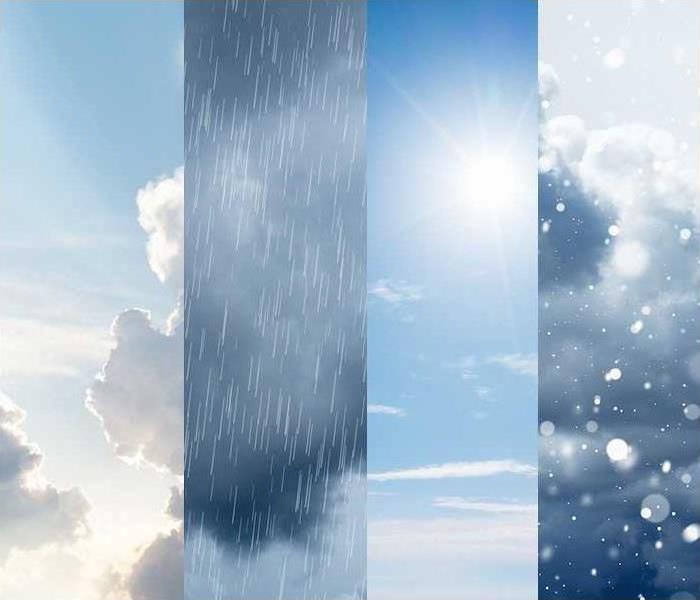 Extreme temperature changes can lead to severe weather. SERVPRO of NW Dekalb/Dunwoody/Brookhaven is a click away if you experience any damage.
Extreme temperature changes can lead to severe weather. SERVPRO of NW Dekalb/Dunwoody/Brookhaven is a click away if you experience any damage.
The United States is the world's third-largest country in terms of total land area, behind only Russia and Canada (though China is larger if all outlying US territories are excluded).
With so many distinct territories all within one country, seasonal weather is extremely diverse in the USA. As a result, each faces unique weather threats of differing degrees throughout the year.
Let's look at what to expect from some of the key areas in spring, as well as what we need to be aware of here in Georgia, when two warm and cold air masses meet throughout the country.
The Pacific Northwest is prone to significant rainfall during the spring, which can cause floods and water damage to houses. Snowfall will continue at higher elevations, and the melting and runoff from that will bring new concerns of their own.
The longest winter is in the Upper Midwest and Northeast, with temperatures sticking around for the entire season. Extreme cold and the prospect of snowstorms and blizzards may be expected from Maine to South Dakota throughout late spring or early summer, when temperatures start to rise.
On the other side, residents of the southern West Coast should be wary of intense heat waves and safety concerns, as well as possible tsunamis on Hawaii's South Pacific coast as a result of tectonic activity.
From Iowa to Texas, storms, droughts, and possible blazes will be a worry for the heartland. Wildfires can quickly spread when the wind is strong and the weather is dry. In addition, Tornado Alley lies in this region; it has a high rate of tornadoes.
Extreme weather is also a concern in the Southeast, especially in Georgia, where tornadoes and severe thunderstorms can occur in landlocked states, as well as hazardous rip currents on the coast and hurricanes during the spring. Clouds, thunderstorms, and tornadoes are common in Georgia during the spring and summer. Remnants of tropical storms that have been blowing across the sea may also trigger significant floods.
No matter where you live in the United States, weather is always a major concern. Your state might have different weather than your friend's state, but it is always a good idea to be prepared.
Help is only a phone call away if extreme weather causes you to suffer property damage from water, fire, or other agents. For prompt and professional restoration, contact SERVPRO of NW Dekalb/Dunwoody/Brookhaven.
Preparing For Vacation: How To Ensure Safe Water Systems
2/21/2022 (Permalink)
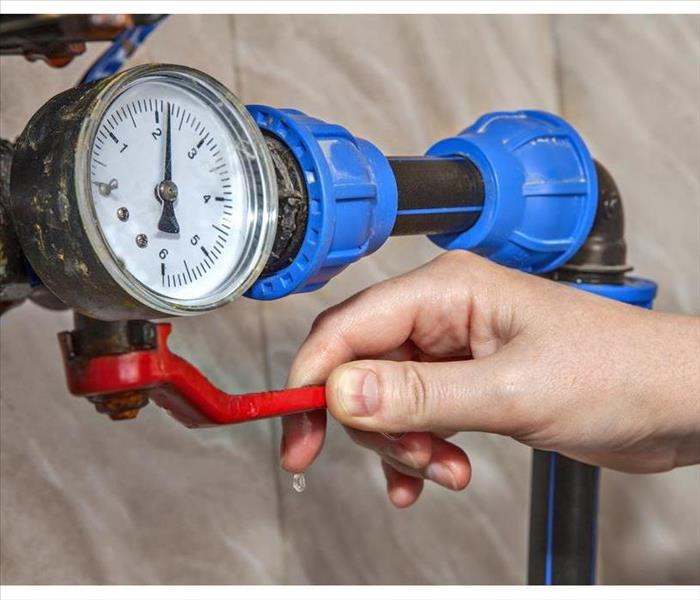 Turn off the main water supply.
Turn off the main water supply.
How To Ensure Safe Water Systems When Going On Vacation
Water pipe repair and flooded homes are difficult to deal with at any time of the year, but flooding issues can be exponentially costlier when you are on vacation if the water sits for an extended period of time before you discover it. For peace of mind while you are away, be sure that you take the following precautionary measures to ensure that no preventable water catastrophes happen in your home.
1. Keep Your AC On
This may seem counterintuitive, but keeping your AC on a higher temperature in summertime (or a lower temperature in wintertime) can prevent unnecessary condensation or pipe freezing. If your thermostat is programmable, set it to stay at a manageable temperature while you’re away.
2. Turn Off the Main Water Supply
Turning off the main water supply is perhaps the most important step to ensuring that you won’t have to deal with needless water pipe repair issues upon your return. If you have someone watch your home or your pets while you’re away, you can simply turn off pipe lines that lead to your appliances.
3. Check Your Sump Pump
Make sure your sump pump is in working order by pouring water into it. If it’s working properly, this should trigger the sump pump to turn on. If the pump is not working correctly, you’ll want to see about repairing it before you leave on vacation, to avoid further damages.
4. Change Your Supply Lines
Plastic lines break easily, so be sure to check supply lines and swap out any plastic lines with stainless steel lines. Stainless steel lines are inexpensive, so it’s well worth the small investment.
While you are preparing to leave on vacation, if you find that you already need to repair a broken pipe or locate a water leak, be sure to phone your local residential water damage specialists in Gainsborough, GA, to fix the problem. By settling all your water pipe repair concerns ahead of time, you can enjoy a relaxing, stress-free vacation.
4 Fire Safety Tips for Pet Owners
2/14/2022 (Permalink)
 Pet safety is important, remember to include your furry friend in your fire escape plan.
Pet safety is important, remember to include your furry friend in your fire escape plan.
How To Keep Your Pet Safe During a Fire
When you have pets, they become part of the family. Because they are so important to you, their safety is a top priority. Here are some tips for keeping your furry companions safe in case of a fire emergency in your Doraville, GA home.
1. Have an Escape Plan
While it is something that you hope you won’t need, it is important that you have an escape plan in case of a fire. You should include all family members in this plan so that everyone knows how to leave the home safely. Be sure to practice removing the animals from your home as well. Including pet preparation in your plan can help things go more smoothly during an emergency.
2. Know Your Pet’s Favorite Spot
A fire can be scary not only for you but for your pet as well. If your pet becomes alarmed or afraid, it may seek out a place where it feels comfortable. If this place is small and out of the way, it can make it difficult to locate your pet during a fire emergency. If you notice that your pet tends to spend a lot of time in a certain area, making a note of it can help you find your pet more quickly during a crisis.
3. Keep Your Pets Secure
Pet safety is important once you’ve removed them from the house as well. If you have a leash or a pet carrier, keep it in a convenient and easily-accessible location so that you can grab it quickly while leaving the house. If your pet is panicking, it may decide to run once outside and you may not be able to locate it after the situation has settled.
4. Keep Important Documents in a Fireproof Box
While this might not be an immediate concern during an emergency, it is a good idea to keep ownership papers and records in a fireproof box so that they can be easily recovered during fire remediation.
Including your pets in your fire emergency preparations can ensure that everyone makes it out of your home safely.
Winter Storm Damage: Preparation, Mitigation and Renovation
2/2/2022 (Permalink)
 Adding extra insulation to attics, crawl spaces and basements is likely the best.
Adding extra insulation to attics, crawl spaces and basements is likely the best.
Winter Storm Tips
When business owners hear the phrase storm damage, they likely think of hurricanes, tornadoes or other warm climate weather, but the winter months can be just as devastating. The frigid temperatures and ice and snow storms can lead to all types of property damage, but the costliest problem is likely a burst pipe. For that reason, it is key to prepare your building and exposed pipes for the coming winter.
1. Insulation
A frozen pipe is building pressure from the inside that may eventually force a break in the seal or explode out through cracking and breaking the line. To prevent a line break, you need to keep areas where exposed pipes are located warm. This means adding extra insulation to attics, crawl spaces and basements is likely best.
2. Installation
Another excellent way to protect exposed pipes from becoming a burst pipe is to add insulation or other heating elements directly to the pipe. You can purchase pipe sleeves or even UL-listed heat tape and install it over the pipe to help prevent freezing.
3. Relocation
A more expensive approach is to relocate exposed and exterior pipes to a warmer and interior location. You will likely have to hire a professional as this job may require special permits and a level of expertise beyond your skillset.
4. Restoration
While preparation and mitigation are effective solutions, you should find and resolve current plumbing issues before they become a problem. Established leaks only make exposed pipes more vulnerable. Consistent leaking can weaken the pipe and its seal while making the pipe more prone to freezing. Check your property for standing water as one common sign of leaking, and call a disaster remediation specialist in the North Atlanta,GA, area to help you resolve the issue.
A burst pipe can be detrimental for a business, possibly causing temporary shutdown for cleanup and restoration work. To prevent freezing during a winter storm, follow the above tips, and rest assured that your business is protected through the long winter months.
Don’t Ignore a Toilet Overflow
1/26/2022 (Permalink)
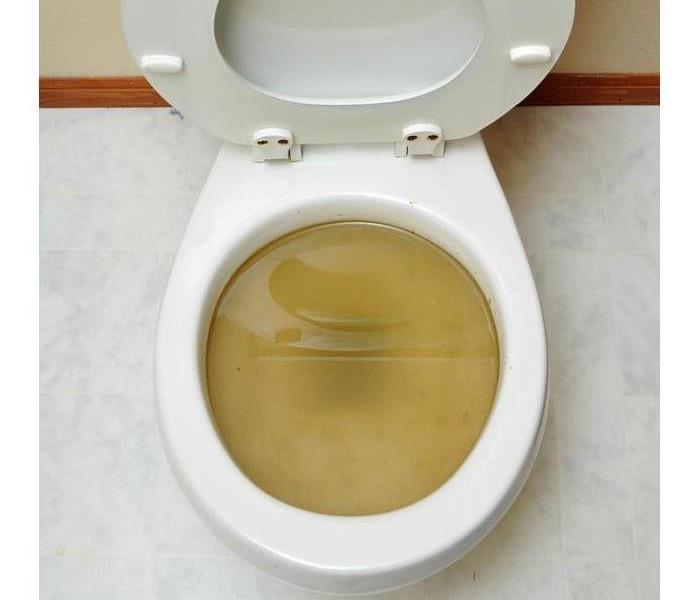 In overflowing toilet in a Brookhaven, GA home.
In overflowing toilet in a Brookhaven, GA home.
Steps To Handle an Overflowing Toilet
Sewer damage in your home is just repulsive to think about, but it is best to think about it before it happens so you are prepared to clean it up the right way. Here are some things you should know so you can handle an overflowing toilet in your home in Brookhaven, GA.
Not Your Average Flood
When you have sewer damage overflow, it’s not your average flood water. This means extra precaution is needed in the cleanup of a flooded toilet:
• Skin should be protected from exposure by wearing gloves and boots.
• Cleanup will require the use of antimicrobials and disinfectants.
• Some materials may not be cleanable and need to be replaced.
When it comes to clean up, you need to keep safety in mind because this is a black water flood.
Mold Growth
Proper cleanup must also consider the prevention of mold growth. A toilet overflow always comes at a bad time, and you may be tempted to go on to work with a plan to deal with the damage later. Delays in cleanup could cause problematic secondary damage, like mold growth. In just 48 hours, mold can start to grow. That may sound like enough time to go to work and come back, but then your materials would be so saturated with black water that it may take much longer to remove and dry everything. Once mold colonies start forming, it’s really hard to get them under control.
Professional Help
Who should you call for help? Don’t look for a sewage company to help because you need a full disaster mitigation specialist that can handle all aspects of cleanup and restoration. You want someone that is knowledgeable about black water cleanup including proper safety practices and prevention of secondary damage.
Summary
When you have a toilet overflow in your home, you want to prepare yourself for the additional complications associated with that type of problem. Professional sewage cleanup and water mitigation will ensure your home is restored to the condition it was in before the sewer damage.
3 Things To Know About Using a Fire Extinguisher
1/21/2022 (Permalink)
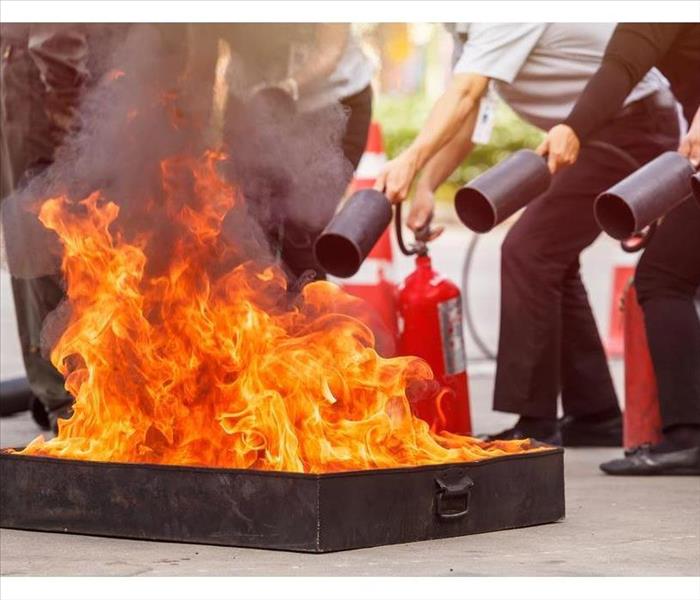 A fire contained in a trashcan could be extinguished quickly by an employee.
A fire contained in a trashcan could be extinguished quickly by an employee.
Three Things to Keep in Mind When Using a Fire Extinguisher
No matter the size, fires are dangerous. Employees need to evacuate a building if a fire is out of control. However, if a fire at your building in Dekalb, GA, is small and contained to one area, it is possible to eliminate the flames on your own using a fire extinguisher.
1. Know Your Equipment Before Disaster Strikes
While the steps required to use an extinguisher aren't exceptionally complicated under normal circumstances, things can change when a fire starts. The best way to prevent damage as a result of a small fire is to be acquainted with the extinguisher before you ever need to use it. This means yearly training on how to operate it. The more familiar an employee is with this device, the easier it will be to use when the time comes.
2. Assess the Fire Before You Act
A commercial building fire can cause fear and panic, but it's important to remain calm. The first thing to do during a fire is to activate the fire alarm. If a fire is large or out of control, employees should follow the building's evacuation plan and leave intervention to the fire department. If the fire is small, however, it might be possible to use a fire extinguisher to eliminate it. For example, it's possible that a kitchen fire on a stove or a fire contained in a trashcan could be extinguished quickly by an employee.
3. Use the Extinguisher Correctly
When using an extinguisher, here are a few things to keep in mind — although you should always read and follow your specific device's instructions.
- Pull the pin on the extinguisher; this will break the tamper seal.
- Always aim low and point the nozzle at the base of the fire.
- Squeeze the handle to release the firefighting agent.
- Step from side to side while using the extinguisher. Continue this motion until the fire is extinguished.
Repeat the last three steps with the fire extinguisher until the flames are out. If there is any doubt that you have not successfully snuffed the fire, evacuate immediately. Leave the firefighting to the professionals and the fire damage assessment to restoration experts.
How To Prevent a Mold Problem After a Flood
1/12/2022 (Permalink)
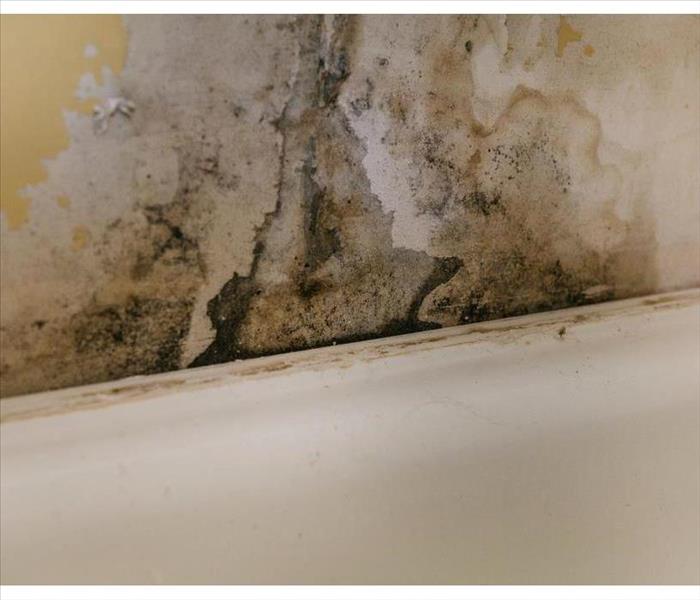 Flooding can cause many issues in your home.
Flooding can cause many issues in your home.
How to Avoid a Mold Problem Following a Flood
Flooding can cause many issues in your home. It can damage the structure of your walls, ceilings and floors. It can ruin personal items and spoil any food or toiletries it touches. If left untreated, it can also lead to mold growth. There are several things you can do to ensure that your home in Chamblee, GA, doesn't develop a mold problem in addition to water damage after a flood.
Have the Experts on Speed Dial
Your first instinct may be to call your insurance agent, but your next call should be to water mitigation experts. These professionals offer several valuable services when your home has been flooded:
- Assess extent of damage
- Create a remediation plan and timeline
- Provide an estimate of the cost of repairs
- Confirm level of damage for insurance purposes
Mold growth can occur within 24 hours of the appearance of excess moisture, particularly if it is coupled with contamination, as floodwater tends to be. Calling the experts the moment you know you need them is your strongest defense against a fungal invasion.
Get Rid of the Water
Floodwater creates a breeding ground for mold on any surface it touches. If you don't want to add mold removal to the list of expenses you incur from the flooding incident, you must remove its cause. A sump pump is useful for extracting the excess water and letting the surfaces start to dry.
Control the Humidity
Humid air can be just as inviting to mold spores as standing water. If you can safely use a dehumidifier, it can help lower the moisture in the air to discourage fungus growth. If it is not safe to plug in a machine, however, you can still increase the air flow to help dry out your home with fans and, if the air outside is not humid, open windows.
Preventing mold growth can be a challenging task, but it is possible if you act quickly. By calling in experts and reducing the moisture in your home and in the air, you can decrease your chances of secondary damage.
We’re Ready Around the Clock | SERVPRO® of NW Dekalb/Dunwoody/Brookhaven
12/30/2021 (Permalink)
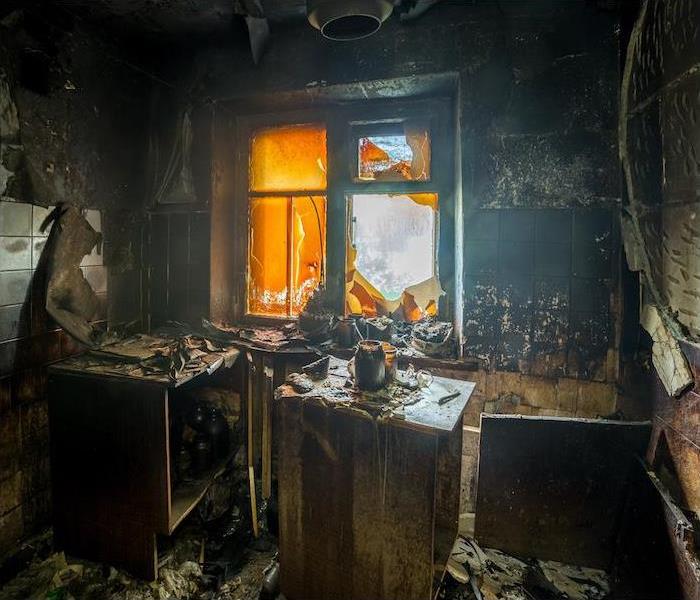 Damaged Kitchen after a fire showing soot on walls and burnt cabinetry.
Damaged Kitchen after a fire showing soot on walls and burnt cabinetry.
If you remember rotary phones in homes and “blue light specials” at the local big-box store, then it’s likely you’re old enough to remember a time when we did much more of something we hardly ever have to do now: waiting.
Remember sitting in a doctor’s office with nothing to do but twiddle your thumbs or check out a three-year-old magazine? Now you can video chat with your physician from home while you play video games in the background.
So much of our lives is instant now, and that’s a good thing—especially when it comes to the urgency of home damage. If something happens in the night or on a weekend to create an acute need for service, you shouldn’t have to wait. And with SERVPRO’s world-class, 24-hour emergency services, you won’t have to.
Fast service and quick action matter, and here’s why.
After a fire. Fire does much damage in the immediate, that’s plain to see. But soot, the sneaky discharge created when combustion goes uncompleted, works behind the scenes to create even more damage, and it starts only minutes after the fire.
Soot and smoke combine to create stains and smells for which there is a very limited window for repair. Once that window passes, the only recourse is to completely reconstruct affected walls to get rid of them. It’s doable, of course, but having SERVPRO on the scene right away will save you time, money, and smelly clothes.
After water damage. It’s hard to miss the puddled water and dripping after a burst pipe, but it’s easy to overlook the fact that 48 hours after water comes in contact with your surfaces, mold starts growing. Mold growth presents a threat to both your health and, eventually, even the structure of your home. The faster your home can be dried and dehumidified, the better off you’ll be.
If storms or natural disasters happen in the night or on the weekend, you’ve got a sudden, acute need, and you shouldn’t have to wait until 9 a.m. the next business day to get help. When time is of the essence, we’re ready to act.
You shouldn’t have to wait for help, and when you link up with us, you won’t. Trust the team that’s Faster to Any Size Disaster. Trust SERVPRO.
When you need help after a home or business disaster, fast service is a priority, and there’s nobody faster or more prepared than SERVPRO. Call us anytime to take advantage of our 24-hour emergency service.
4 Ways To Avoid Secondary Damage
12/24/2021 (Permalink)
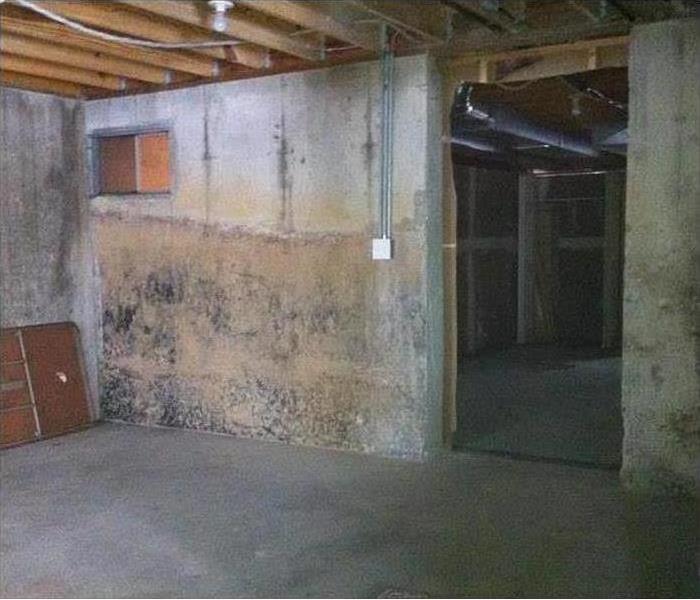 Water damage can result in major problems.
Water damage can result in major problems.
Four Ways To Limit The Risk of Secondary Damage
Water damage can result in major problems at a building in Dunwoody, GA. Additional damage, such as black mold or structural issues, may be caused by primary damage. Here are four ways to limit the risk of secondary damage.
1. Clean Up Primary Damage
The best way to prevent additional damage is to mitigate primary damage as quickly as possible. Water damage can make a structure and contents more susceptible to corrosion, mold, insect infestations, and rot.
In situations involving minor damage from a pipe leak, a building owner or manager may be able to call a plumber and dry the affected area. For major damage or incidents involving contaminated water, it can be beneficial to call in a service that specializes in water damage cleanup.
2. Dry the Damaged Area
In addition to removing water and cleaning or disinfecting the affected area, it is crucial to dry water damage in a timely manner. Most additional damage is due to residual moisture. Restoration professionals may recommend lowering high humidity levels or increasing ventilation.
3. Check For Signs of Mold
Once an area has been cleaned and dried, a building owner or manager should regularly check for any signs of fungus growth. Stachybotrys or black mold is only one of over 100,000 varieties of mold. Fungi can grow in a variety of colors or patterns, but will generally have a fuzzy texture. A telltale odor may indicate the presence of hidden mold.
4. Rely on Damage Restoration Experts
Restoration professionals can make the best choices from the start of the mitigation process onward. This can prevent aspects of primary damage from going undetected and causing further damage.
Secondary damage may range from structural issues or infestations to black mold. These methods can help property owners and managers stop additional damage from occurring after water damage at a building in Dunwoody, GA.
Prevent a Fire in Your Commercial Kitchen With These Tips
12/23/2021 (Permalink)
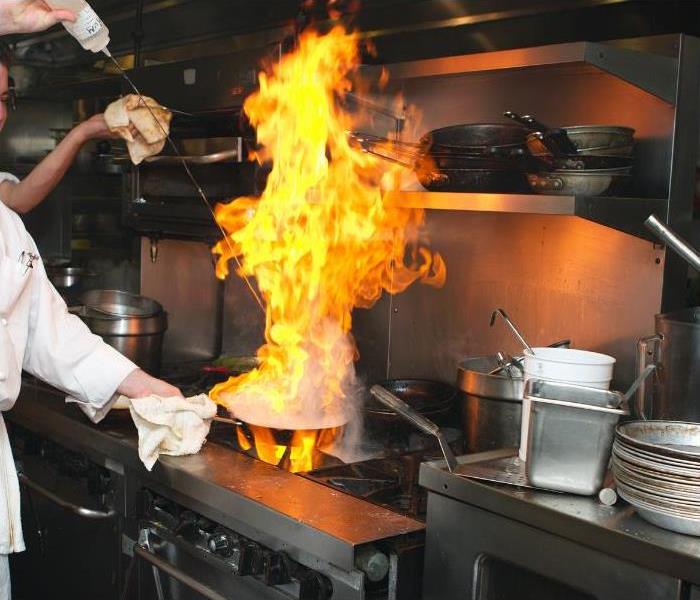 Fire in a commercial kitchen while cooking
Fire in a commercial kitchen while cooking
If you own a restaurant, bar or commercial kitchen in Gainsborough, GA or North Lake, GA, reducing fire risk is critical to continued profitable operation. The National Fire Protection Association (NFPA) reports that fire departments responded to over 7,410 structure fires in the kitchen of restaurants and bars in 2017 alone. The majority of these fires were preventable, resulting in three deaths, 110 injuries, and $165 million in property damage annually in commercial kitchens. These tips will help keep you and your staff safe while preventing shutdowns due to fire code violations.
What Are My Ducting and Air Movement Requirements to Prevent Fire?
While Chapter 7 of the NFPA 96 Standard for Ventilation Control and Fire Protection of Commercial Cooking Operations covers this extensively, here are a few key items to keep in mind.
First, commercial kitchen ducts should never pass-through firewalls, share an exhaust system with the building ventilation, or have obstructed access panels. While doing these things on a commercial kitchen remodel can save costs in the short term, the fire risk increases significantly. If disregarded, your commercial kitchen work will likely not pass inspection.
Make sure to maintain a minimum clearance of 18 inches between combustible materials and the kitchen ducts. This standard is based on Section 4.2 of the NFPA 96, however is one of the easiest to disregard once the kitchen is operational. Ducts can build up high levels of radiant heat that can ignite combustible materials like boxes, cups, plates, utensils, or other kitchen materials.
If you would like additional information on the types of combustible and non-combustible materials that should and shouldn't be kept near the duct, consult Chapter 3 of the NFPA.
What Are My Commercial Kitchen Fire Extinguisher Requirements?
"The NFPA 96 requires automated fire suppression equipment for all grease removal devices, hood exhaust plenums, and exhaust duct systems in a commercial kitchen, as well as any cooking equipment that produces grease-laden vapors." - Koorsen Fire & Security
The NFPA 96 requires use of class K fire extinguishers in conjunction with automatic fire extinguishing systems. These extinguishers also require installed placards stating their extinguisher class. However, in the case of a commercial kitchen fire, it's critical to activate the automatic fire extinguisher system before using portable-type extinguishers. This is because high-efficiency cooking appliances in many modern commercial kitchens are capable of achieving high temperatures that can raise the vegetable oils to intensely high temperatures. When oil ignites at these high temperatures, it can already be so hot that a portable extinguisher is not enough to stop the flames.
Another standard that you should familiarize yourself with is the UL 300 standard.
According to this article by Insureon, a kitchen’s cooking equipment must meet these UL 300 requirements:
- Fire-extinguishing nozzles in the hood, ducts, and above each cooking appliance
- An automatic fuel shut-off capabilities for both gas and electric power sources
- A manual fuel shut-off pull for all power sources
- A wet-chemical fire-extinguishing system that meets UL 300 criteria (one of which is undergoing semiannual checkups by a certified professional)
If you need immediate assistance after a fire, our teams are available 24/7/365. With our promise of being Faster to Any Size Disaster, you can count on SERVPRO of NW Dekalb/Dunwoody/Brookhaven to be there when it counts. Call us today at (770) 396-3883 for rapid assistance.
What Is the Best Equipment for Draining a Flooded Basement?
12/16/2021 (Permalink)
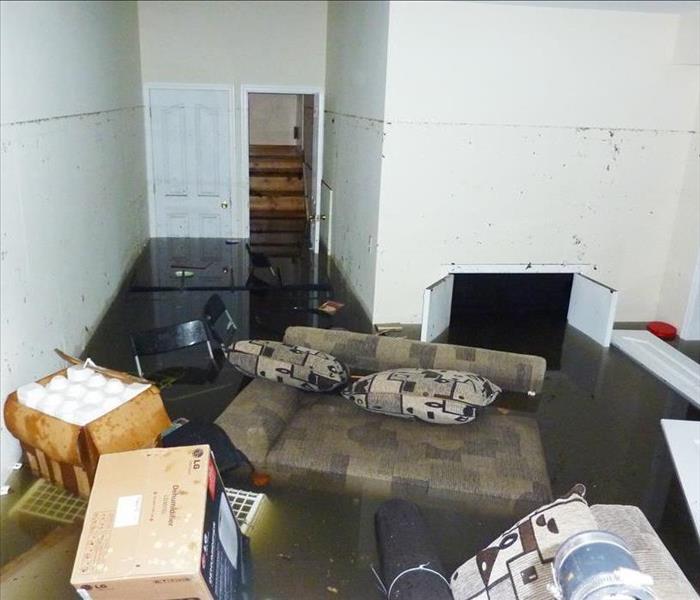 A flooded basement in Mount Vernon, GA.
A flooded basement in Mount Vernon, GA.
Steps To Clean a Flooded Space
Potentially caused by anything from a major storm to a burst water pipe, a basement flood can be a major cleanup job for any homeowner in Mount Vernon, GA, to tackle. If this is your first experience with draining water from the basement, you may need to obtain a few basic pieces of equipment to get started. Consider the following list of helpful tools for cleaning up a flooded space.
Submersible Water Pump
One of the most commonly used tools for water removal is an electric water pump. Be sure to look for a pump that is fully submersible and waterproof. When attached to your household garden hose, this pump begins the process of removing water from the inside of your home. You may need additional equipment such as the following:
- An electrical generator
- Nylon rope
- Heavy-duty extension cord
Wet/Dry Vacuum
In the case of a broken pipe, you may be able to catch leaks in the early stages before water levels get too high. For cleaning up a smaller water mess, you should consider using a standard wet/dry vacuum. Most models hold up to 5 gallons of water at a time and are easy to maneuver as you tidy up a small basement flood.
Dehumidifier
As with any case of residential water damage, getting moisture dried up as quickly as possible is the best way to prevent substantial water damage. Sitting water is one of the quickest ways mold and rot can develop in your home. A dehumidifier may help expel moisture in the walls and floor until professional flood cleanup services arrive at your home.
Check your home insurance coverage for information related to residential water cleanup. Many Mount Vernon, GA, residents already have insurance policies in place to offset the cost of major water damage and repair. As you begin draining water from a basement flood, consider using one or more of these useful pieces of equipment.
What To Know About Dryer Lint
12/6/2021 (Permalink)
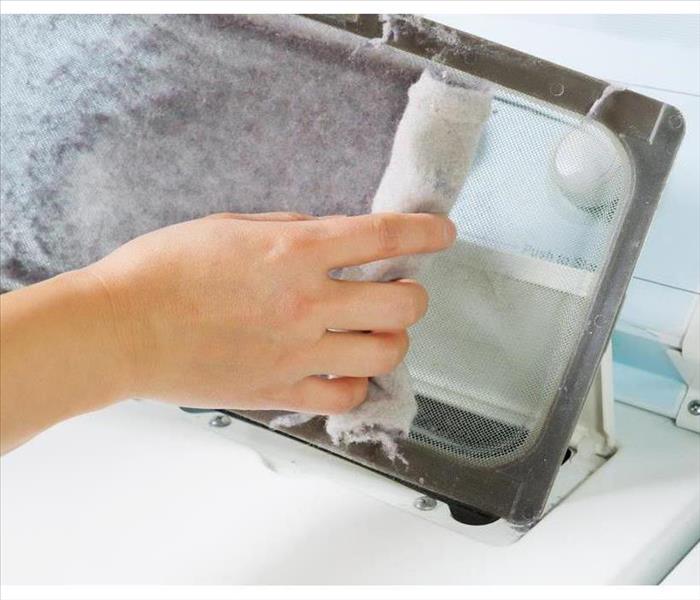 Lint removal in order to avoid a dryer fire necessitates cleaning many areas.
Lint removal in order to avoid a dryer fire necessitates cleaning many areas.
Lint Removal From Your Dryer
To help avoid a lint fire in your Perimeter Center, GA, home, many professionals recommend regular maintenance of your dryer. Fortunately, there are many maintenance steps you can perform yourself. During this process, there are several things you may want to consider about lint removal from your dryer.
Where To Clean
Removing lint in order to avoid a dryer fire involves cleaning several locations.
- The lint screen
- The screen vent
- The exterior vent
- The exhaust hose
- The dryer back
- Behind the back panel
If you’re going to do more than wipe off the lint screen, it’s important to unplug your dryer first.
When To Clean
Many experts recommend deep cleaning your dryer at least once a year in order to avoid the build-up that can lead to a lint fire. If your dryer seems unusually hot during use, or if your clothes regularly fail to dry fully, you may want to perform a clean then as well. If problems persist then it’s recommended to contact a professional. It’s also recommended to clear the lint screen after every use.
Why Clean
Every year fire damage restoration services conduct repairs to homes that experience a fire due to lint built up. When lint accumulates inside the dryer it can cause the appliance to overheat. This is turn can lead to a fire made worse by lint’s flammable nature. Keeping your dryer clean is one way to help avoid this type of fire in your home.
Regularly removing lint from your dryer can help prevent a lint fire in your home. You could consider cleaning all the areas of your dryer including the exhaust hose and exterior vent. The dryer should be cleaned at least once a year, and lint from the screen should be removed after each use. If you think your machine is malfunctioning it’s best to call in a professional.
3 Reasons Your Home May Have Noisy Plumbing Pipes
11/29/2021 (Permalink)
 Noisy pipes in your Briarcliff, GA, home can be costly as well as annoying.
Noisy pipes in your Briarcliff, GA, home can be costly as well as annoying.
Understanding The Meaning Of Noisy Pipes
As a Briarcliff, GA, homeowner, you might be used to all the sounds your home makes, such as which floorboards and stairs creak or the noise of your heater cranking on at night. However, one noise that may spell trouble is when your home’s plumbing pipes start to make noise. Some of these noises may signal an imminent pipe break or flood, so understanding what they mean could help you head off major plumbing problems.
1. Humming
While some noise is common as you run water, noticeable humming could mean that your home’s water pressure is too high. As water runs through the pipes, the pressure causes them to vibrate, which creates noise. Failing to have your home’s water pressure checked could result in a pipe burst and considerable flood, so you may want to address this sound as soon as you notice it.
2. Banging
Banging pipes usually occur when you turn off a faucet and the remaining water in the pipe meets a closed valve. While this is not necessarily a sign of trouble, the water pressure in your home may need to be adjusted. This banging sound, which is also known as a water hammer, could result in a pipe break if the plumbing has any weak elbow joints. Having your plumbing inspected if banging noises increase may prevent a sudden flood.
3. Squealing
If your pipes squeal when you run the water, this could mean that a component inside or around the pipe, such as a washer, is starting to wear out. A water damage and mitigation service may be able to help you decide whether you need a plumber to fix broken pipe parts or whether the pipes need replacing.
Noisy pipes in your Briarcliff, GA, home can be costly as well as annoying. Recognizing the sounds they make may help you prevent a pipe break and untold flood damage.
Are Your Home and Family Safe From a Fire?
11/29/2021 (Permalink)
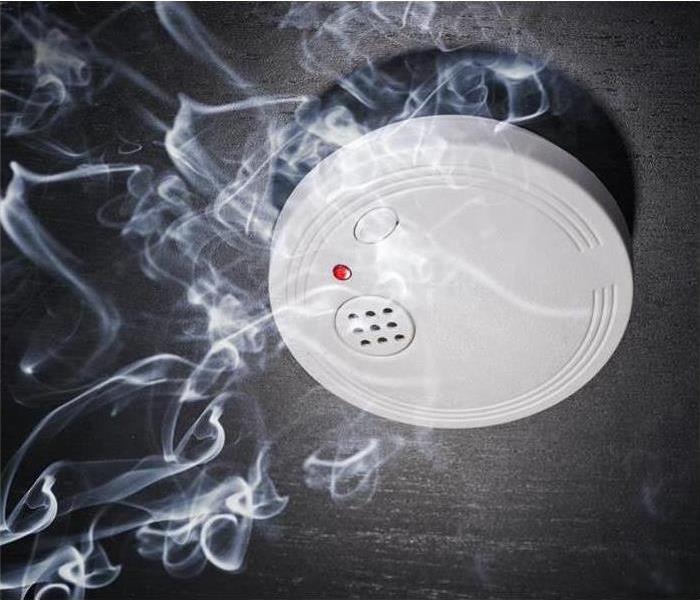 Do you know how many smoke alarms you should have?
Do you know how many smoke alarms you should have?
According to the Institution of Fire Engineers, homes in the United States have a significant lack of smoke alarms. For the safety and protection of your Briarcliff, GA, home, and family, ask yourself these questions and then take any corrective action as necessary for the fire alarm situation in your home:
Do You Know How Many Alarms You Should Have?
Experts recommend having a fire alarm installed in the hall outside bedrooms, inside each bedroom, and on each level of your home. This includes the basement. If you have a two-story home with a basement and three bedrooms, you should have a minimum of six alarms. For the best protection, install an alarm in rooms that have a higher risk of fire, such as the kitchen and garage.
How often should I replace the batteries in smoke alarms?
It's best to change the batteries in your alarms once or twice a year. The easiest way to remember this simple chore is to swap out old and new batteries when you change your clocks or on your birthday or during a summer and winter holiday. This is a quick and easy chore that helps you avoid fire and smoke damage.
How long do smoke alarms last?
Modern fire and smoke detectors have long lifespans but not as long as some homeowners think. Avoid a visit from fire damage cleanup and repair professionals by replacing your alarms every 8 to 10 years. Write the date of replacement on the back of the fire alarm with permanent ink, so you recognize that need for replacement when you change the batteries.
Which type of alarm is best?
There are multiple types of alarms: ionization, photoelectric, and alarms with both sensors. The United States Fire Administration recommends installing both ionization and photoelectric alarms in your home because they detect different types of fires.
You only have about three to four minutes to escape a home fire, even with working alarms. Without the notice provided by your fire alarm, your escape time will be much shorter. Take a few minutes right now to make sure your alarms are in proper working condition.
Why Should You Choose SERVPRO For Your Restoration Project?
11/17/2021 (Permalink)
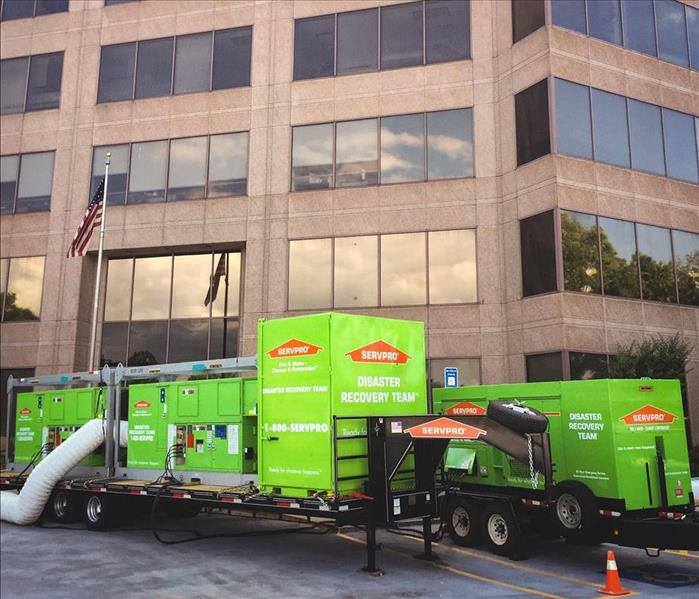 SERVPRO Trailer Mount Restoration Equipment at a Large Property Loss Project
SERVPRO Trailer Mount Restoration Equipment at a Large Property Loss Project
We know there are many choices out there when it comes to restoring your home, business, or facility after a property damage event. While there are many options, choosing the wrong restoration company can cause headaches and stress through a restoration project that can last for many years even after the project is completed. Whether its water, fire, wind, or mold damage, see why we are the best choice for your peace of mind during and after you experience a property loss.
We Carefully Follow Industry Protocols
The IICRC (Institute of Inspection, Cleaning, and Restoration), is a world-renowned global certification and standard-setting organization for our restoration industry. Since 1972, they have successfully established protocols and procedures that help ensure the utmost quality in any restoration project done by IICRC certified firms and professionals. SERVPRO of NW Dekalb/Dunwoody/Brookhaven ensures each of its field technicians is trained according to IICRC standards, so you can have peace of mind knowing your restoration project will be completed to the highest level of quality and efficiency.
Extensive Network of Subcontractors
Our licensed subcontractors specialize in reconstruction, electrical, plumbing, mechanical, and asbestos abatement. Which enables us to provide full-service restoration services during your mitigation and reconstruction project. All subcontractors are carefully vetted, and skill tested before they ever visit a jobsite. That way, you know your project is in excellent hands from beginning to end.
Proven Project Expertise
Since 1998, we have completed many thousands of commercial and government projects. As a learning organization, we are focused on continual growth and improvement as well. So with our extensive project experience and many 5-star reviews on Google, you can trust that SERVPRO of NW Dekalb/Dunwoody/Brookhaven will bring the knowledge and experience you can trust to your fire, water, wind, or mold restoration project. No project is too large or too small for our team.
Large Inventory of Equipment
From Air Movers to industrial-grade dehumidifiers, air scrubbers to generators, our team has the right equipment for any size job. Combined with the latest monitoring equipment technology available, you can rest assured that your large loss will be in the best hands. Not only is our restoration equipment inventory extensive, but we also maintain strict maintenance schedules for every piece of equipment that enters or exits our over 100,000 SF facility.
Beyond Standard Dedication to Quality
We understand the hardship and stress that can come with a property loss event. That is why we are dedicated to ensuring a smooth restoration process for you in your restoration project with clear and consistent communication from start to finish. That commitment to providing a high-class restoration experience extends to how we maintain our equipment and facility as well. Every piece of equipment that returns from a project is carefully taken apart, cleaned, inspected, and rebuilt to effectively prevent cross-contamination from project to project while ensuring efficient operations so you can get your property back "Like it never even happened."
See for yourself why SERVPRO is the number 1 name in the property restoration industry. Call us today at (770) 396-3883 for 24/7/365 assistance.
What Sets Smart Smoke Detectors Apart?
11/10/2021 (Permalink)
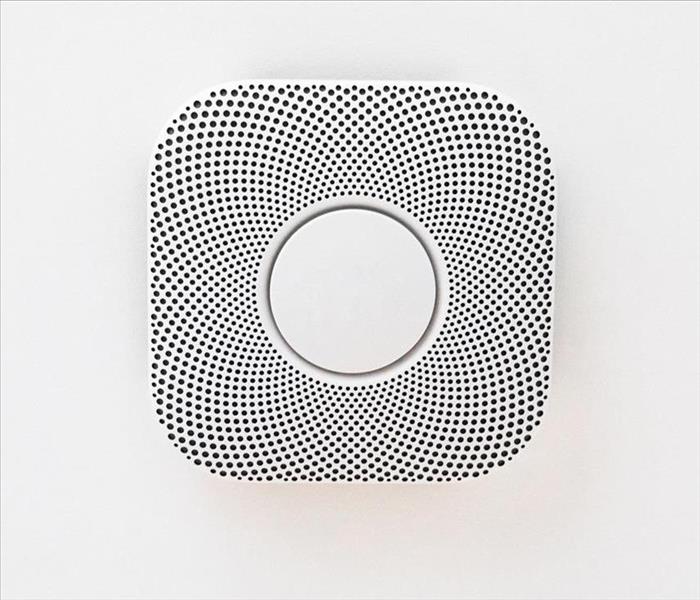 Smart smoke detectors are a relatively new technology.
Smart smoke detectors are a relatively new technology.
Smart smoke detectors are a relatively new technology that can send push notifications to smartphones and may be controlled remotely. Find out how a next-generation smoke alarm can protect your home.
Smart Alarms Types
There are three types of smart fire safety devices:
- Smart batteries
- Smart detectors
- Listeners
Smart batteries can be used in standard battery-powered smoke detectors or as backups in hardwired units. Smart detectors may cover more square-footage than standard alarms and can be controlled remotely. Listeners send alerts when any alarm is triggered.
Technological Differences
A smart battery is an affordable way to monitor your home while you are out. This technology functions like a nine-volt battery but has Wi-Fi connectivity to send notifications. You can silence battery-powered alarms remotely, but this function does not work for hardwired alarms with smart battery backups.
A smart smoke alarm also sends notifications, can be remotely controlled and may be capable of monitoring more than one floor of your home. Some devices alert users to elevated carbon monoxide levels. Listeners send notifications whenever an alarm sounds in your home, though these devices are not capable of silencing alarms.
Smart Alarms Effectiveness
A single smart alarm may monitor an entire floor of your home, or more. If your home is spacious, you may want to just install a listener to notify you of any alarms.
Smart Detector Costs
Smart fire safety solutions are available in a wide price range:
• The initial smart battery unit retails for about $35 with $15 replacements once or twice a year
• Smart detectors start around $100
• Listeners range from $50 to $100
Consider a smart smoke alarm or smoke detector device to receive timely push notifications about alarms. All of these devices can increase overall safety at your residence in Perimeter Center, GA. If a fire results in damage, rely on the expertise of damage restoration professionals.
Develop a Business Continuity Plan in 4 Steps
11/10/2021 (Permalink)
 Conduct a business impact analysis.
Conduct a business impact analysis.
Four Steps To Develop a Plan After a Disaster
Business owners can minimize losses due to disruption after a disaster by making a business continuity plan. These four steps will help you develop a plan to keep operating after a disaster or reopen as soon as possible.
1. Conduct a Business Impact Analysis
Gather data on revenues and expenses and perform detailed assessments of the costs associated with various risks. In addition to fire, flooding, or storm damage, an impact analysis should also factor in delays or shortages of supplies or services. This analysis is also useful for determining the amount of business interruption insurance coverage needed to offset lost revenue and continued operational costs.
2. Plan Recovery Strategies
The right recovery strategies depend on the nature of a business and the level of interruption coverage. Determine whether you can operate out of a temporary location or even keep the main location open in the event of partial losses. Identify which costs or losses can be recouped through business insurance and perform a gap analysis to identify what is not covered. Strategize about how to minimize losses and quickly resume operations.
3. Implement Continuity Measures
Once you have an impact analysis, gap analysis, and strategies for recovery, you are prepared to lay the groundwork for the continuity plan. Organize a team responsible for enacting these strategies in the event of an interruption.
4. Perform Tests and Training
Put your calculations to the test as you implement these measures and train the continuity team. Update the plan with findings from testing and training.
Follow these steps to develop a continuity plan for a business in Mount Vernon, GA. Refer to a federal guide to continuity plans for further guidance. It may take anywhere from 48 to 72 hours for business interruption insurance to start. A commercial damage restoration company can help you repair damage and resume operations in a timely manner.
“Do I have Water Damage On My Ceiling?” Steps to Take
11/5/2021 (Permalink)
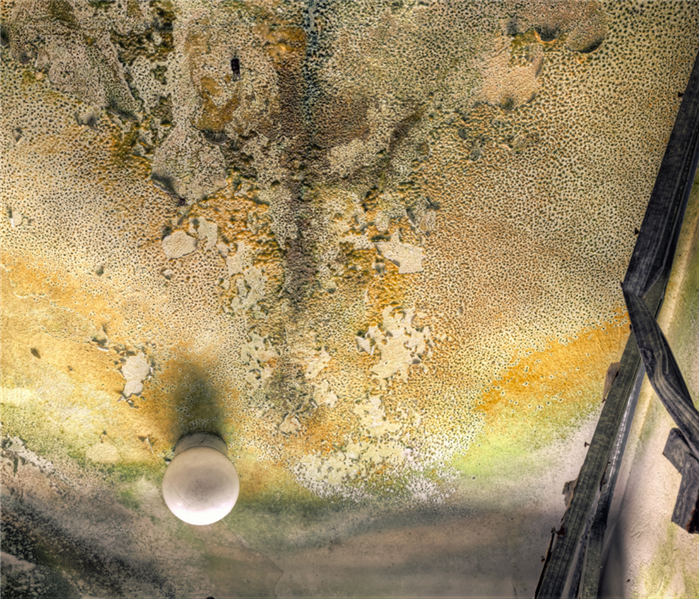 Water Damaged Ceiling Covered in Mold
Water Damaged Ceiling Covered in Mold
After a water damage event, your ceiling might become covered in water stains and mold. Before you call up your local ceiling repair company, there are several steps you can take to assess whether or not it's time to call the experts. This guide will explain what to do when there is water damage on the ceiling so that you can save money on emergency services and speed up the cleaning process. If you need help, consider hiring professionals like SERVPRO of NW Dekalb to remove excess water and repair damaged materials. Here’s what you should do after a water damage event.
How to Tell If Your Ceiling Has Water Damage
The first step in determining what to do when there’s water damage on your ceiling is knowing whether or not you actually have water damage. In mild leaks, this can start to appear as slight discoloration on the ceiling, or peeling paint. As leaks increase in severity, they can begin to crack the ceiling or cause the drywall to sag, bow, or shift. Because different types of damage require different solutions, it’s essential to first identify yours. Some are easy to spot, while others can be difficult for an untrained eye.
What Does Ceiling Water Damage Look Like?
Ceiling water damage can be difficult to see because of its location, but it can be easier than you think when you know what you're looking for. The top layer of drywall can become brittle and crumble if exposed to too much moisture. Look out for crumbling drywall or signs of mold growth. If you spot any discoloration or spots, then there’s a strong chance there’s some hidden water damage lurking behind your ceiling. When ceiling water damage becomes severe, it can cause cracking or peeling of the ceiling. Then, if water begins to collect, the ceiling can begin to warp and bow downwards. Don’t hesitate; act now! The longer you wait, the worse things can get.
If you think there is a potential for water entry, be sure to call SERVPRO of NW Dekalb for immediate assistance.
Track Down and Repair the Source
If you can, attempt to identify and stop the source of water from creating further water damage. When significant damage is suspected, our suggestion is to immediately notify your insurance provider and take photos and video of all affected areas before attempting to stabilize the situation. Keep in mind though, that in some cases attempting to stabilize the leak yourself can damage the area further. Proceed with care.
Stabilize the Area Around the Leak
Next, it’s important to stabilize any area around a ceiling leak. This may be as simple as taping off surrounding areas with plastic and tape or moving furniture away from wet carpeting or rugs. Avoid tracking water through your home to prevent the spread of any possible bacteria or pathogens inside after inspecting your ceiling for leaks.
Clean up all standing water as soon as you can, so it doesn’t have time to cause damage. Or, if the damage allows significant water entry, then professional equipment and expertise may be needed.
Call An Expert
If you are unsure of the source of water entry or the damage becomes significant, experts like SERVPRO of NW Dekalb have the right expertise and equipment to identify, control, and restore the situation. We will rapidly and effectively make your property "Like it never even happened."
Call us today at (770) 396-3883 if you need assistance.
We are always Here to Help.
Recovering Your Personal Possessions From Mold Damage
10/27/2021 (Permalink)
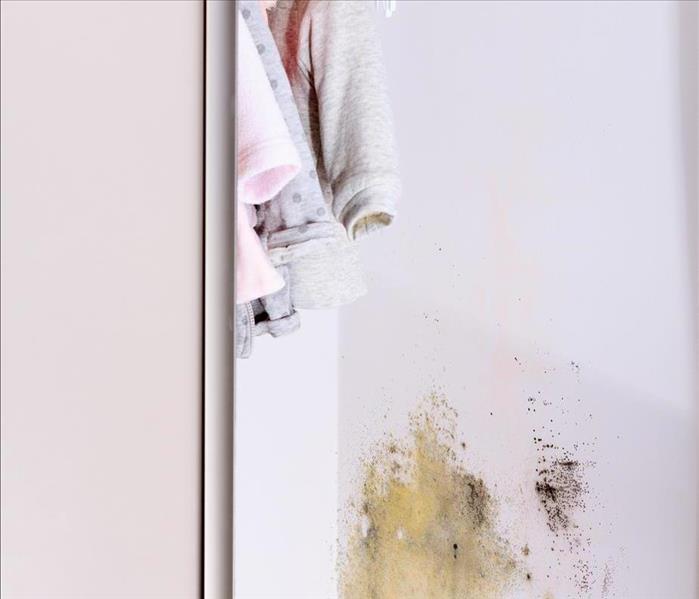 Always conduct periodic home inspections to avoid mold growth.
Always conduct periodic home inspections to avoid mold growth.
Recovering Your Personal Property After Mold Damage
If you’ve found mold creeping on your personal belongings, you may have no choice but to throw them out. Keeping even one mold-infested object can lead to a full-on outbreak that can contaminate other areas of your house. If your belongings are mold-contaminated, consider eliminating them from your Briarcliff, GA, home. However, if these objects have sentimental value, there may be ways to salvage them with mold cleaning.
Ways To Recover Mold-Damaged Belongings
Mold cleaning is something that shouldn’t be undertaken lightly, and if your belongings don’t have a smooth surface that can be easily wiped clean, you would be better off trusting a mold remediation specialist. Here are your options for recovering items plagued with mold damage:
• Gently wipe with detergent and water. Smooth surfaces such as plastic and non-engraved metal may respond to a cloth soaped in detergent and water, as long as there are no grooves, designs, or anything else that might capture mold or make the surface porous. If the item does not respond to gentle wiping, leave it alone and either dispose of it or hire a professional. More vigorous scrubbing may release spores into the air.
• Hire a specialist. Mold remediation specialists often have customized devices that can recover clothing, leathers, and paintings in particular – such as an Esporta machine. These specialists are also trained to safely handle mold-damaged items without risking further damaging them with corrosive chemicals or rough handling.
Always Focus on a Mold-Free Home
While it may seem like there are limited options for mold cleaning, one of the best ways to avoid this entirely is to keep a mold-free home. Always conduct periodic home inspections and cleanings to ensure there are no opportunities for mold to take root. You can preserve your belongings by keeping them dry and storing them in a cool, well-lit place where mold is less likely to proliferate.
Filing Your Fire Damage Claim: What Damages Should You Include?
10/27/2021 (Permalink)
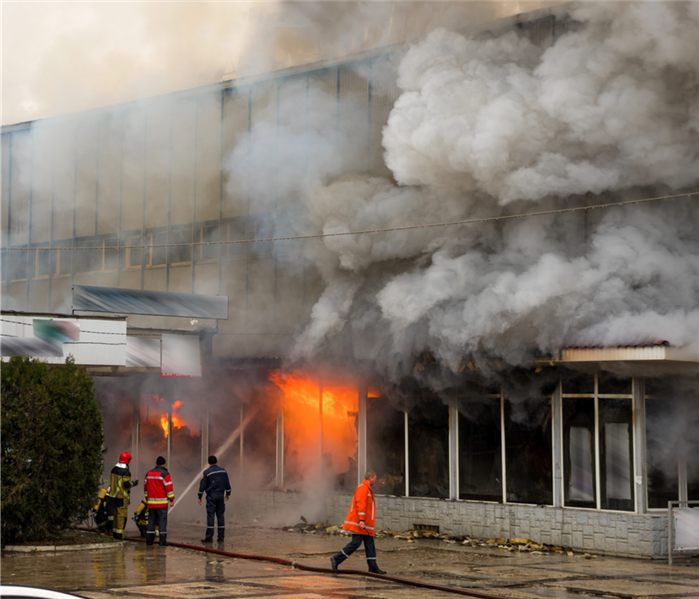 Commercial fire damage in Perimeter Center, GA.
Commercial fire damage in Perimeter Center, GA.
Filing a fire damage claim can be an overwhelming and confusing process. Dealing with insurance adjusters is never straight forward, and often, damage that one assumes would be covered by one type of policy is often covered by another type of policy. For instance, water damage from bursting pipes and sewage overflows may be covered by a standard homeowner's policy, but water damage from a flood would require a separate flood policy. The same is true of loss due to fire. For this reason, talk with your Perimeter Center, GA, insurance adjuster regarding what each policy does and does not cover so that you can ensure that you're covered no matter what.
What Fire Insurance Covers
Most fire insurance policies typically cover fire mitigation efforts of all buildings affected, regardless of where the fire originated. Additionally, most policies cover smoke and water damage due to a fire for up to one year after the fire took place. Most companies will not cover fire damage due to arson or any other malicious acts, such as burglary, theft or rioting. However, it does cover loss due to the following:
- Electrical shorting
- Faulty wiring
- Gas explosion
- Lighting
- Natural disaster
Some policies may even cover fires started because of burst or overflowing pipes or water tanks.
Though policies are designed to cover property damage and loss, many identify the same exclusions. Some such exclusions include:
• Specific items such as works of art, manuscripts, drawings, plans, securities, stamps, coins, accounting books, computer system records and the like
• Cold storage inventory
• Any boiler or machine in which steam is generated inside and if damage to it was caused by its own implosion
• Perishable goods
• Intellectual property
When drafting your policy, discuss with the insurance adjuster other possible exclusions. Some companies may allow you to negotiate for inclusions for an additional fee.
A Perimeter Center, GA, fire mitigation team can help you assess the fire damage, provide an official report and ensure that you recover the most compensation for your damaged items. If your building was recently affected by a fire, contact your local remediation team right away.
How To Determine If a Toilet Should Be Replaced or Repaired
10/13/2021 (Permalink)
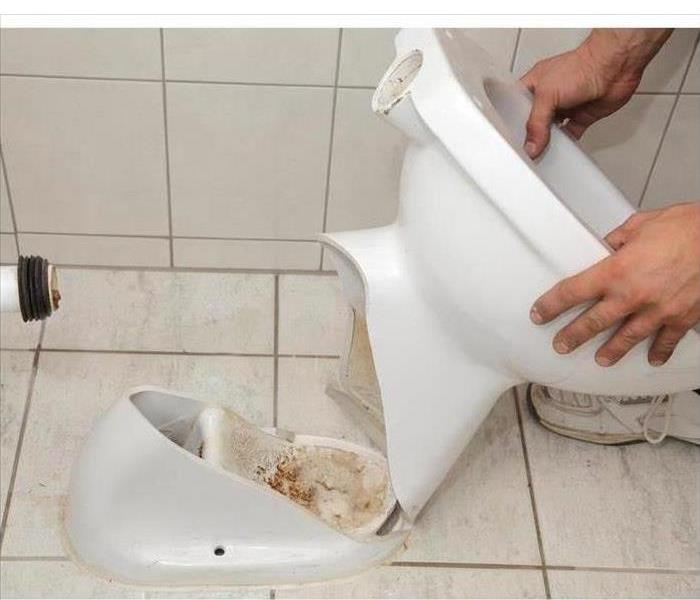 Many people put in a new toilet themselves, while others hire a plumber for the job.
Many people put in a new toilet themselves, while others hire a plumber for the job.
The most essential piece in the bathroom, if not the most glamorous, is the toilet. It should provide years of service with very little maintenance. However, now and again, this amazingly reliable device requires some attention. A leaking toilet often allows water to come out at the base, dampening the flooring and resulting in wet feet. If left alone, the water will soak into the wood and eventually cause the subfloor to weaken. The problem toilet should be fixed right away, either by a plumber or by a competent homeowner. The problem in these situations is often an old gasket, which can be replaced in a few simple steps.
Repair or Replace?
A leaking toilet in Gainsborough, GA, can almost always be repaired for just a little bit of money. Some situations, though, call for replacing an old toilet with a new one. Here are some common reasons for getting a new toilet:
- The commode keeps breaking down
- It is cracked
- It costs more to repair than to replace
- It is out of style or doesn't match the room
- The toilet is too low or too high
Many people put in a new toilet themselves, while others hire a plumber for the job. The new unit should work well for many years without much need for toilet repair.
Call or Wait?
If a leaking toilet causes water damage, a question arises on whether or not a professional water remediation team should be called. If the problem is minor, a homeowner can fix the leak and wipe up the water spill, making sure to dry out the entire area. If a spill, leak, or overflow results in contaminated water on carpeting, flooring, or other surfaces the professionals should be consulted. This is also true for any large or medium leaks that require wet vacuums to remove the water or a lengthy period of drying. Water damage, if not addressed properly, can continue to create problems long after a leak is stopped.
Water on the Brain: Troubleshooting Your Company’s Irrigation System Water Pressure
9/19/2021 (Permalink)
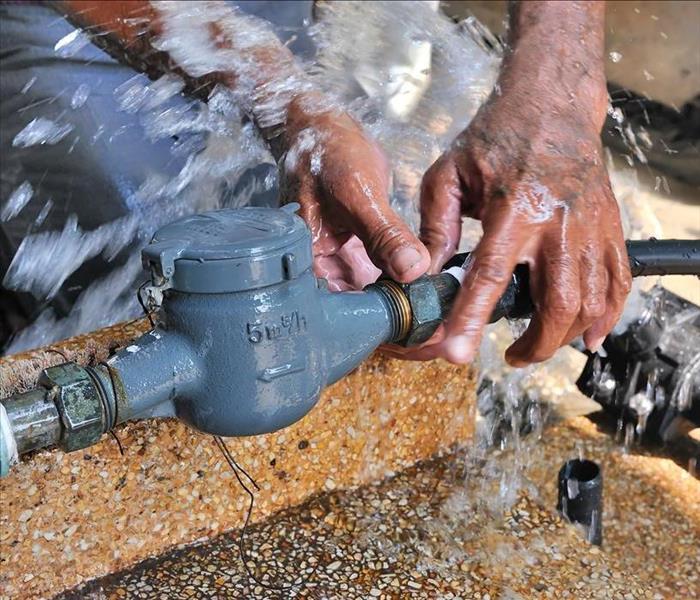 Luckily, the steps above may be able to help restore your irrigation needs.
Luckily, the steps above may be able to help restore your irrigation needs.
An irrigation system, especially a large one, can come with a fair share of irrigation problems, water pressure being the most common. If you are looking to troubleshoot typical water pressure issues, then look no further than the list below.
1. Check Backflow Device
While it may seem obvious to some, most water pressure issues stem from a valve that is not entirely in the on position. As valves are located above ground and near the exterior of the building, they can be accidentally or purposefully manipulated. The valve handle on the backflow device should be completely parallel with the pipe.
2. Check for Leaks
If the valve on the backflow device is in the fully on position, then check the zone that is ineffectively watering for signs of leaks. Several signs of a leak, aside from low pressure, are water coming up from the soil, divots or depressions, or saturated areas. Once you locate the approximate area of the leak, you can begin digging down to expose the pipe and repair the damage.
3. Check for Choked or Crushed Pipes
If you cannot locate any visible signs of leaking in your irrigation system, then you may have a choked or crushed pipe. A choked or crushed pipe can occur when roots grow around a line, or heavy machinery has compressed the soil. Search for the last fully functional sprinkler head and begin digging along the line because the damage likely occurred between this head and the malfunctioning head.
4. Call for Help
If you are having difficulty locating the damaged area of your system, or if numerous areas around your property are not working correctly, it may be time to call in an expert from the DeKalb, GA, area, as they may be able to resolve the issue a little faster.
A business depends on an irrigation system to maintain an attractive appearance, but low water pressure can be the difference between a green exterior or an arid one. Luckily, the steps above may be able to help restore your irrigation needs.
Keep First Aid Kits Stocked and Ready
9/14/2021 (Permalink)
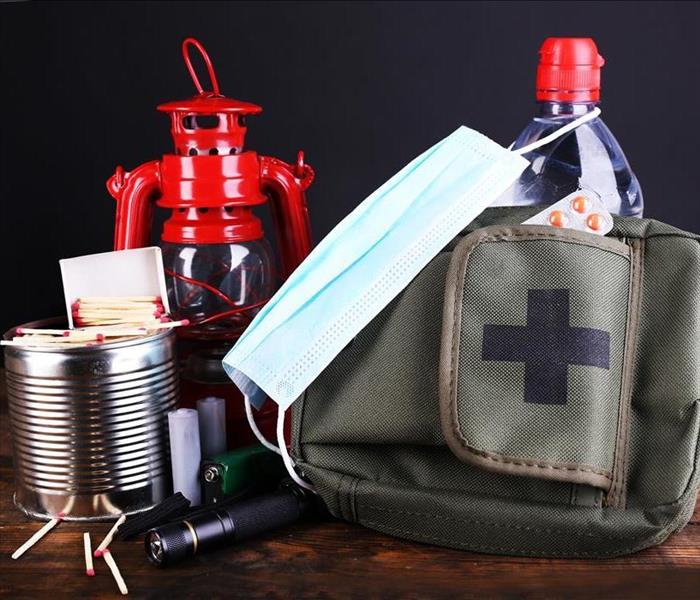 Being prepared is always key, even if the situation is unexpected.
Being prepared is always key, even if the situation is unexpected.
Steps In Creating A First Aid Kit For Your Business
If a storm wreaks havoc on your North Atlanta, GA, business, you can trust a water damage and restoration professional to get it back to normal. The first priority should always be the safety of anyone on the premises. Every business needs to have a first aid kit, and potentially more depending on the size of the company, to ensure that happens. Luckily, creating one doesn't have to be a complicated process.
What to Include
A first aid kit can be tailored to fit each unique company’s needs, especially if there are additional potential risks faced outside a normal office setting. No matter what industry, the following should be included:
- Various sizes and shapes of gauze pads, adhesive bandages, and gauze roller
- Alcohol or moistened towelettes for cleaning
- Medical tools including scissors, tweezers, adhesive tape, and disposable gloves
- A minimum of one blanket
- Resuscitation bag, airway or pocket mask
- A splint and elastic wraps
- Emergency assistance directions
How to Maintain
A business needs to be able to rely on an emergency kit at a moment’s notice, so it is important to establish a person to be in charge of maintaining kits. A checklist should be created to keep tabs on the established number and type of item to help ensure it remains stocked. An inspection should be done regularly to verify that it will be ready when needed.
When doing an inspection, it is also important to not just count what is there. Some items could be damaged or expired. Keeping track of frequently used items is also important. It can help you better plan what to stock, as well as determine if a smaller everyday kit needs to be available and easily accessible.
Being prepared is always key, even if the situation is unexpected. Maintaining a fully stocked first aid kit is one way to ensure employee and customer safety.
Steps of the Sewer Damage Cleaning Process
9/7/2021 (Permalink)
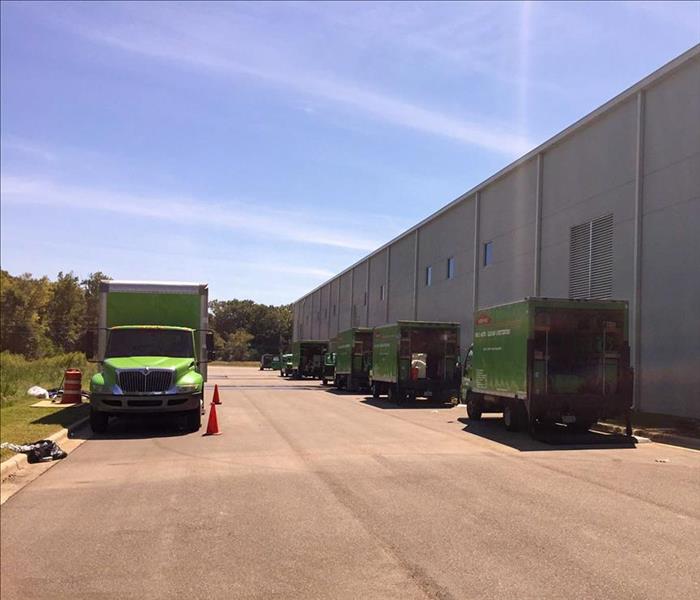 Knowing the process can help you understand the timeline for completing it.
Knowing the process can help you understand the timeline for completing it.
If your commercial building in DeKalb, GA, has sewer damage, the cleaning process is more involved than regular water damage. Because sewage is considered one of the more hazardous types of Category 3 water, extra precautions must be taken to deal with it safely. The following steps outline the sewer cleanup procedure taken by certified restoration technicians.
1. Wearing Personal Protective Equipment
Before entering the space affected by sewer backup, technicians must don their PPE. This includes coveralls that protect skin and face masks and respirators to protect eyes, noses, mouths, and lungs. Waterproof gloves and rubber boots are worn to protect hands and feet.
2. Identifying Source of Problem
Before sewer cleanup can start, the problem must be identified and stopped. For example, a flooded toilet can be unclogged, and a broken pipe can be repaired. Once the source of the sewage has been thwarted, then the cleaning process begins.
3. Containing Items and the Area
Items that are affected by the sewage must be bagged for later assessment. The area must be sealed off from surrounding areas so that secondary damage does not occur.
4. Drying the Area
The standing water with sewage in it must be extracted from the area. Technicians will likely use industrial pumps to remove and contain the water. Then all surfaces must be dried.
5. Disinfecting the Area
Industrial strength cleaners that kill bacteria and harmful microbes are used to completely disinfect the area. Because sewage is such a harsh contaminant, surface testing must be completed to ensure that the cleaners worked.
6. Repairing Structure and Items
Walls, floors, ceilings and items that are destroyed must be thrown away. Everything else must be cleaned and repaired before people can enter the area again. For example, walls that were torn out must be replaced, and items that were dirty must be sanitized. Only then is the restoration complete.
If you need sewer cleanup in your building, there will be more steps than if the damage was from clean water. Knowing the process can help you understand the timeline for completing it.
Listen to Dave Matthews and Don’t Drink the Water: What You Need to Know about Black Water
9/2/2021 (Permalink)
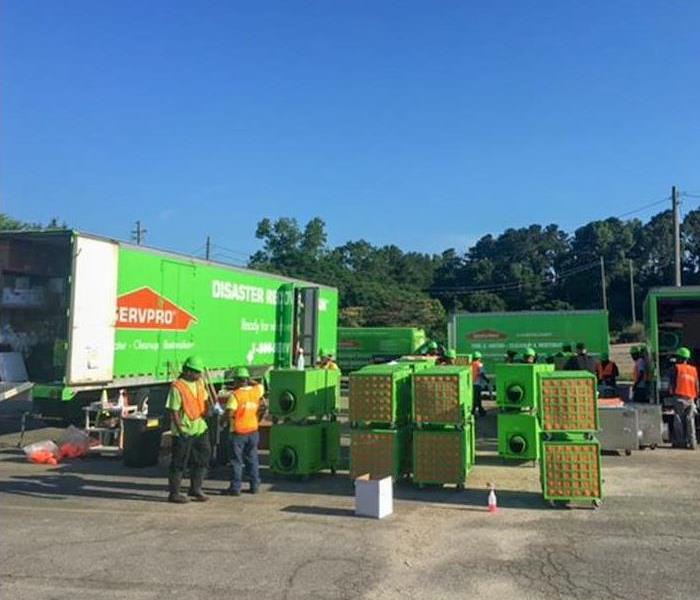 Blackwater damage at any level is dangerous. The mixture of sewage and other contaminants provides a significant health risk, and it should be avoided
Blackwater damage at any level is dangerous. The mixture of sewage and other contaminants provides a significant health risk, and it should be avoided
A flood can cause significant damage, but the most significant risk comes from standing water, especially when that water is considered black water. This type of water is created from above-ground flooding and sewage backups, and it is considered contaminated and toxic to people and animals, causing both severe illness and even death. That being said, there are three levels of black water damage, each with varying degrees of severity.
1. Level I
At Level One, this type of contamination is limited to a single structure, and it typically affects a small area. Additionally, this type of water contamination is realized and resolved quickly. A restroom with an overflowing toilet is an example because the situations are usually fixed quickly, not allowing time for the water to penetrate the structure or other porous materials.
2. Level II
At level II, the damage is more significant than Level I because the exposure time and contaminated area are more significant. In this instance, there will likely be a need to remove any items, porous or nonporous, that touched the contaminated water, including furniture, drywall, carpeting, fabrics, and cabinets.
3. Level III
At level III, the water damage is extensive and was brought on by outside sources like city mains and septic systems and is further exacerbated by storm surges and the rising of rivers and streams. Level III usually has a longer incubation time, meaning that the water is filled with a mix of mold, viruses, bacteria, and sewage.
While saving money is tempting, cleaning up from a flood yourself is not always advisable as the water is now a dangerous substance. Check with the North Atlanta, GA, municipality, or your insurance provider for suggestions of local restoration specialists.
Blackwater damage at any level is dangerous. The mixture of sewage and other contaminants provides a significant health risk, and it should be avoided at all costs.
Addressing Black Mold in Your Commercial Building
7/26/2021 (Permalink)
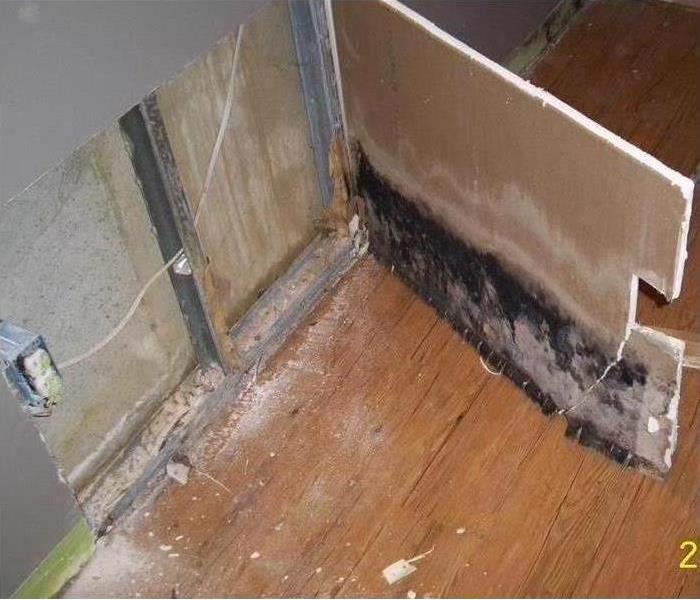 Mold growth behind drywall.
Mold growth behind drywall.
Coming across black mold in your Gainsborough, GA, commercial building is never a fun experience. The best way to confront the unwelcome fungus, however, is to understand its growth habits. You may have been led to believe that mold will only grow in specific spots, but the truth is, this type of fungus thrives in even the most unpredictable places. What, then, do you need to know about this type of mold and how to remove it from your building?
Understanding Mold Growth
Its also referred to as toxic mold, and there are a few important facts that you should be aware of when faced with this highly regenerative fungus:
- Mold can grow and colonize anywhere.
- Mold usually carries an odor.
- Prolonged and excessive moisture encourages mold spore reproduction.
- Forty-eight hours is all it takes for mold growth to begin when water is present.
- The microscopic spores can enter your building in a variety of ways.
Identifying Moisture Problems
Arguably the biggest issue surrounding the presence of black mold is the moisture problem. When exposed to water, mold spores flourish and rapidly reproduce. What kind of moisture should you be on the lookout for?
Common water-related issues can come from broken pipes, flooding, high humidity, and a broken supply line. Exposure to water stemming from any of these problems will allow the mold to thrive and grow unless the moisture is addressed and the fungus is properly cleaned up.
Cleaning Up Toxic Mold
You will want to clear out the fungus growth as soon as possible. The best way to tackle your mold cleanup project is to let the experts handle it by contacting cleanup and restoration specialists who are familiar with this type of problem. Calling on the experts can give you peace of mind that your toxic mold problem is being dealt with in the most thorough way possible.
Black mold can be a headache, but knowing your enemy is half the battle. By understanding how the fungus grows, potential moisture causes and the pros of hiring specialists to take care of the cleanup, you can rest assured that your mold problem will be no more.
The ABCs of Home Fire Extinguishers
7/23/2021 (Permalink)
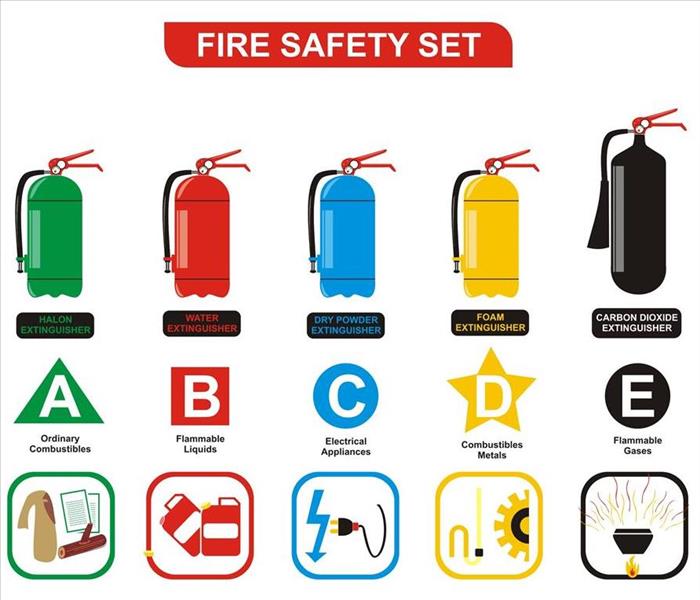 Most household extinguishers can put out a home fire and electrical fire at the same time.
Most household extinguishers can put out a home fire and electrical fire at the same time.
The ABCs Of Fire Extinguishers At Home
The unique shape, markings, and color of the fire extinguisher have long been established and accepted. Therefore, when standing near a small fire, everyone knows to look for the long, red cylinder to use for fire suppression. What most people do not know is that there are different types of classifications of household fire suppressors, and once purchased, the chemicals inside are not good forever.
Classifications
The fire extinguisher has been around for over 150 years. Originally designed to put out combustible fires with potassium carbonate, as times changed and fires evolved, so did the fire suppressors. The units now come in three types:
Class A is for use on ordinary household combustibles.
Class B can be used on flammable gas or liquid.
Class C units are designed for use on electrical fires.
Although the specially designed fire containment containers used to be manufactured with only one of the various class of chemicals, the new and modern versions often contain all three. For that reason, most household extinguishers can put out a home fire and electrical fire at the same time.
Longevity
Fire repair and restoration teams stress the importance of understanding that fire extinguishers are not meant to last forever. Depending on the brand you buy, the manufacturers typically state that most expiration dates fall somewhere between five and fifteen years from purchase date. If the label does not have a date, or there is no inspection tag attached to the unit, look at the pressure gauge and recharge as soon as the needle falls below the green area.
Safety
Your home in Chamblee,GA may be your castle, but if you do not have a fire preparedness plan in place, that castle could quickly burn down. Keep your fire extinguisher handy, do not store it away in inaccessible areas. It only takes a few moments for a fire to overwhelm a room, but if you have the suppressor close at hand, you can be on top of the fire and not let it grow out of control.
Preparing Your Home for an Extended Absence
6/28/2021 (Permalink)
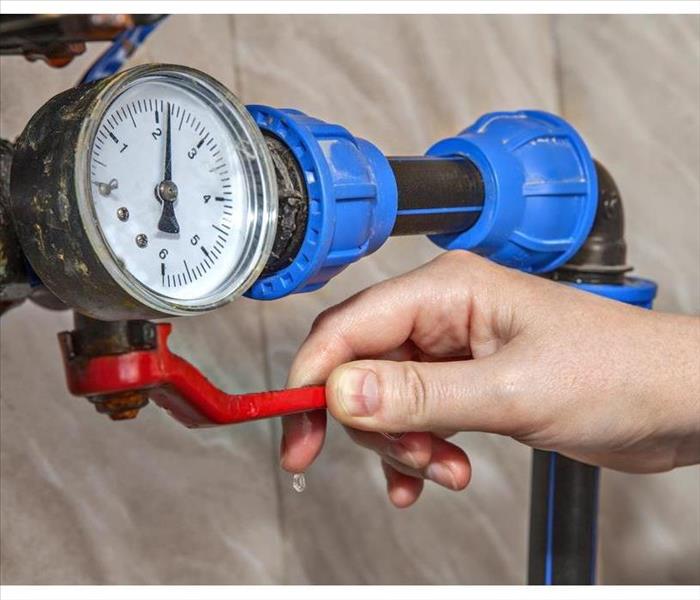 Turn off the water supply to your house.
Turn off the water supply to your house.
How Do I Prepare My Home For Extended Absence?
Are you thinking of ditching your Chamblee, GA, home for a two-week getaway on white-sand beaches? Perhaps you want to leave your home unoccupied for an entire winter to escape the cold. Whatever your plans, you should do what you can to prepare your house for an extended absence. If you fail to do this, you may come home to a flooded kitchen thanks to the unnoticed need for water pipe repair.
• Have it inspected. You may think all your plumbing is in working order, but leaks can be hidden within the depths of your walls. Calling in a plumber or residential water repair expert can help you make sure there are no hidden problems. Don't forget to have someone check your sump pump and other equipment to make sure your home is ready for heavy rain.
• Clean your gutters. No matter what time of year you're leaving, you should clean out your gutters before departing. Clogged gutters can allow rainwater to sit on your roof, which can increase the chances of leaks into your attic space and the rest of your house.
• Turn off the water. If you're going to be gone for a long time, you could turn off the water supply to your house. This can help protect you from a major water pipe repair as soon as you get back.
• Protect your pipes. If you are leaving for the winter, you need to make sure your pipes are well-insulated. This is especially true if you plan on turning off or lowering the heat. A frozen pipe can quickly turn into a broken pipe while you are away.
• Hire a sitter. Ask a neighbor, friend, or relative to stop by your home every few days. If the basement becomes flooded after heavy rain, a house sitter can catch the problem before it turns into a moldy issue.
Taking vacations is a great way to relieve stress. You can prepare your house for a vacancy to reduce the need for a water pipe repair when you get back.
Dry It, Don’t Fry It: Tips for Reducing the Chances of a Dryer Fire in Your Home
6/28/2021 (Permalink)
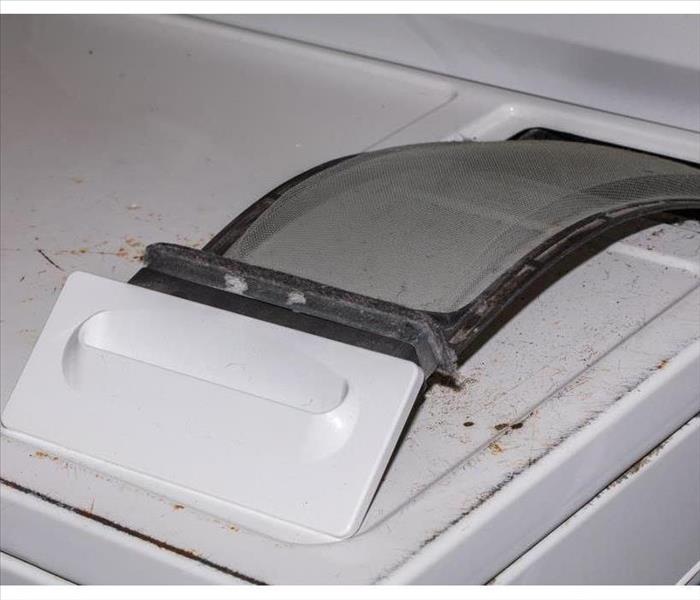 Your dryer should help you, not hinder you with fire.
Your dryer should help you, not hinder you with fire.
How Can You Prevent A Dryer Fire?
Like dozens of other appliances and hardware in your home, your dryer was designed to make life more convenient. It allows you to get done with your chores faster so you can spend more time with friends, family, and simply doing what you love to do in North Atlanta, GA. However, they’re also one of the leading causes of house fires in the United States. The average lint fire has caused
- Nearly 2,900 emergency calls each year
- 5 deaths and 100 injuries annually
- $35 million in property damage in the span of a year
Luckily for you, there are plenty of things you can do as a homeowner to prevent one of these common fires from starting in your home.
Dry Smaller Loads
When you overload your dryer, it leads to a wide number of issues. An overloaded dryer contains more clothes for a blaze to feed on in the early stages. Drying smaller loads is not only more efficient in the long run, but it’s safer and takes a little extra time and effort from you.
Clean and Maintain Your Lint Trap
An overloaded or otherwise problematic lint trap is the leading cause of dryer fires. The dust, hair, and threads that make up the material in the lint trap are extremely flammable. If the buildup becomes too much, the high heat of the dryer itself can set it ablaze. Therefore, empty out your lint trap between every load to avoid a lint fire.
Be Aware of What You’re Drying
Unfortunately, not everything can go in the dryer. The high heat settings can burn, melt other otherwise destroy items that contain foam, rubber, or plastic. Rather than using the appliance, set these items outdoors or in another open space to dry. It’s just as effective and reduces the chances of accidentally starting a dryer fire.
Your dryer should help you, not hinder you with fire. Following these simple tips takes only minutes during your regular laundry routine and can drastically reduce the chances of a lint fire happening in your home.
Find the Right Time for Employees To Return During Flood Cleanup Using 3 Guidelines
6/28/2021 (Permalink)
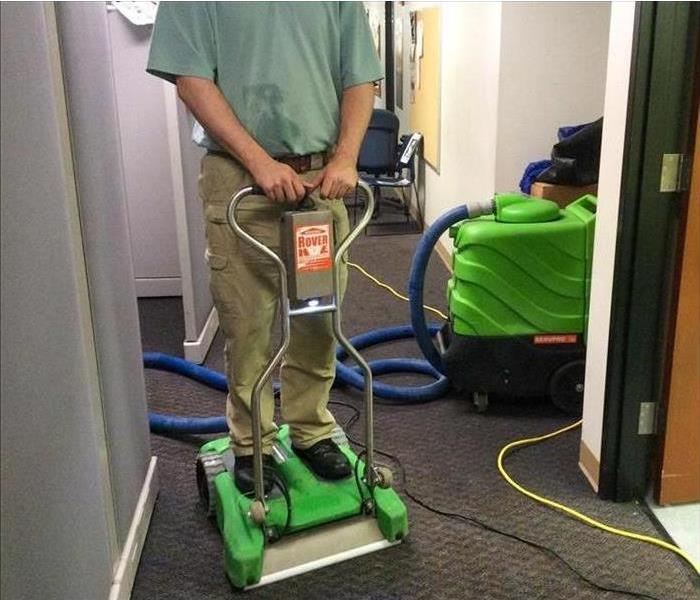 Water removal in Doraville, GA.
Water removal in Doraville, GA.
Find the Right Time for Employees To Return During Flood Cleanup Using 3 Guidelines
Your business in Doraville, GA, may be recovering from the flood, but there is catchup work to be done to make up for the time lost to closure for restoration. Eager owners and employees may be wondering when it’s best to return to a business location that recently suffered black water damage. Following these three guidelines will give a general idea of the appropriate time to resume using a building.
1. Water Sitting Untreated Can Be Dangerous, So Don’t Enter Early
Even if it starts out clean, a flood can create an electrocution hazard or become contaminated with microorganisms or hazardous building residues like asbestos and lead. It’s difficult to know what’s in the standing water as it stagnates without testing, so it’s advised for no one to be near it before it’s removed and sterilized.
2. Disinfection Is Often the Key Milestone for Returning
Black water includes toilet overflow and sewage. It is not advised to work around potentially dangerous waste without high-grade protection. Your workers can typically expect safe premises after the cleaners disinfect and clean the building. Before that, there could be dangerous debris washed up in water that could still be around on the flooring.
Disinfection comes late in the process because the water needs to first be removed for the room to be properly disinfected. Any components or assets in the area that were soaked in contaminated water are removed or demolished during this process. It is likely safe to request to resume use of the building afterward.
3. Ask the Restoration Company Directly If Uncertain
As experts in the field, the professional flood damage restoration crew can offer the best estimate for their processes. Flood cleanup can differ depending on many factors, so it’s best to get an answer directly from the specialists.
The loss of wages and revenue can motivate people to come back to a flooded business sooner than later, but first, the cleanup process needs to reach its goals so the building is no longer at risk. Verifying the black water is fully treated saves the trouble of problems from a premature return.
How Can You Prepare Your Business for a Snowstorm?
6/14/2021 (Permalink)
 Check the weather forecast every few days.
Check the weather forecast every few days.
Winter storms are not unusual in Dunwoody, GA. Owning a business in this region means being ready for a big punch. However, if you’re prepared for the weather, a snow storm can be nothing more than a passing inconvenience.
How Can You Know One Is Coming?
Weather is a hot topic these days. While there’s still a lot of guesswork in forecasting, modern science has helped their accuracy enormously. Big storms are typically predicted days before they strike, and this is disseminated through many channels, including
NWS radio
NWS Website
Emergency phone alerts
Radio
Television
Many NWS local stations also post weather information to social media. If you’ve heard talk about a coming storm, make sure to check one of these sources. Also, check the long-term forecast every few days. If a storm is predicted, pay close attention and get ready if you aren’t already.
How Can You Be Ready When a Snow Storm Hits?
Winter storms are one of the costliest disasters to hit the U.S. They can blanket an entire region with feet of snow and often paralyze cities. A business may choose to shut down when a large storm is approaching. If so, you should shut off utilities and depressurize your plumbing to avoid a pipe burst if any of it is susceptible to cold weather.
Large snowstorms often ride on a front boundary that tends to be close to freezing. However, once the storm passes, extremely cold air often follows, meaning that exposed plumbing must be prepared for it.
What Should You Do If Your Business Is Damaged?
Commercial storm damage needs to be inspected immediately by a winter weather restoration expert. If it has left areas exposed to the elements, your building will need to be tarped and boarded. Heavy snow can damage roofs and ice jams can cause mass destruction. Call as soon as possible because, in a large storm, they’re likely to get pretty busy.
It’s up to you to ensure your business is ready for a snow storm. Discuss your plans with key employees and consider all the likely contingencies.
What Personal Protective Gear Is Used in Mold Remediation?
6/14/2021 (Permalink)
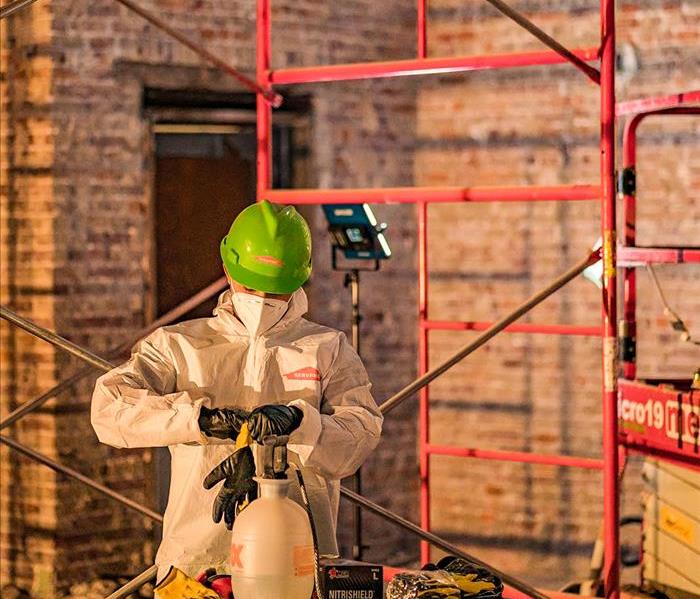 SERVPRO techs always wear the proper equipment.
SERVPRO techs always wear the proper equipment.
Personal Protective Gear
Following a water incident in your Dunwoody, GA home, you must take swift action to resolve the issue. Standing water and moisture can cause more problems than just water damage; mold damage is also a real threat if excess humidity lingers. It's best to hire water damage restoration professionals to manage the cleanup process. Still, whoever does the work needs to wear personal protective equipment, such as face masks. This PPE will help keep the workers safe and prevent cross-contamination into unaffected areas of the home.
1. Hair Covers
A worker should put on a hair cover before work begins, then remove and throw it away before leaving the affected area. Upon reentering the contaminated area, a worker should replace their hair cover with a fresh one.
2. Safety Goggles
Safety goggles for mold remediation should be closed on all sides to prevent mold spores and other debris from getting in the eyes. They'll also keep eyes protected from harsh chemical splashes and fumes.
3. Respirators
Respirators, or face masks, are the most essential pieces of PPE for mold damage restoration. By utilizing the proper mask (e.g., N-95), you'll protect yourself from inhaling mold spores and other debris that's stirred up during the remediation process.
4. Gloves
Disposable latex gloves are best for use during mold cleanup. Like the other PPE, it's vital to remove them before leaving the affected area, then replace them before resuming work.
5. Coveralls
Coveralls will help keep your clothes free of mold spores, cleaning chemicals and other contaminants. Ideally, coveralls will cover your arms and legs fully so that nothing can penetrate your shirtsleeves or pantlegs.
6. Shoe Covers
Shoe covers will protect your shoes from causing cross-contamination to unaffected areas. It's essential to remove them before leaving the mold-infested space and replace them with a new pair upon return.
If you discover mold in your home, it's critical to begin the remediation process immediately; mold will spread and can rapidly get out of control. Be sure all workers wear face masks and other PPE to keep everyone safe and the rest of your home clean.
Mitigating Fire Damage for Your Business
4/19/2021 (Permalink)
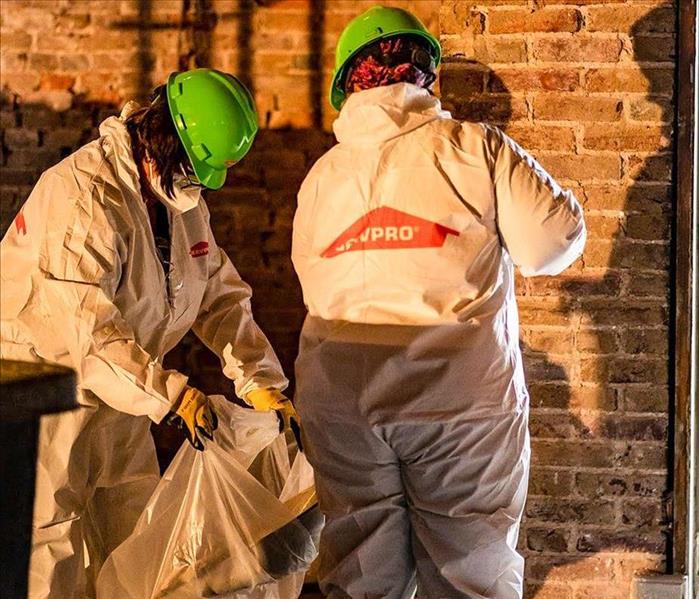 Mitigating fire damage to your business in Brookhaven, GA.
Mitigating fire damage to your business in Brookhaven, GA.
Are You Prepared?
No one likes to think about what will happen in an emergency. Making a contingency plan for things like natural disasters isn’t at the top of anyone’s “want to do” list. There’s a reason, though, that schools across the nation have recurring drills for a variety of situations as part of their emergency plans: If your people know what to do in the event of a crisis, you're less likely to experience losses.
1. Prepare Your People
People are the backbone of your business. As valuable as your staff is to you, you’ll want to have fire response measures in place that include an evacuation plan that you actually practice.
Think back to your fire drills from school. Everyone knew to stay quiet and stay together while walking quickly to a predetermined location. You practiced it often. Your teachers reminded you to stay together and not to run. When you got to the predetermined safe location, there was someone in charge who took attendance and reported anyone missing to the fire department. As a business owner, take charge of your employees’ safety by practicing these things, too.
2. Prepare Your Documents
Virtually every organization generates paperwork and records. Anything that’s vital for your business should be stored in a fireproof safe.
Another good failsafe for you to work into your contingency plan is keeping a second copy of those documents at an alternate site. Check with your legal department or independent council about whether you should keep those copies in the cloud or retain physical paperwork in a second location offsite.
3. Prepare for Afterwards
If the day comes where your company requires the services of a fire restoration specialist, you should have more than just a vague idea of who to contact. Be aware of the businesses in Brookhaven, GA that perform these services and their reputations.
Time is of the essence in an emergency. Your fire contingency plan will help your business thrive no matter what Mother Nature has in store for you.
What Is a Board Up Service and Do I Need One?
3/30/2021 (Permalink)
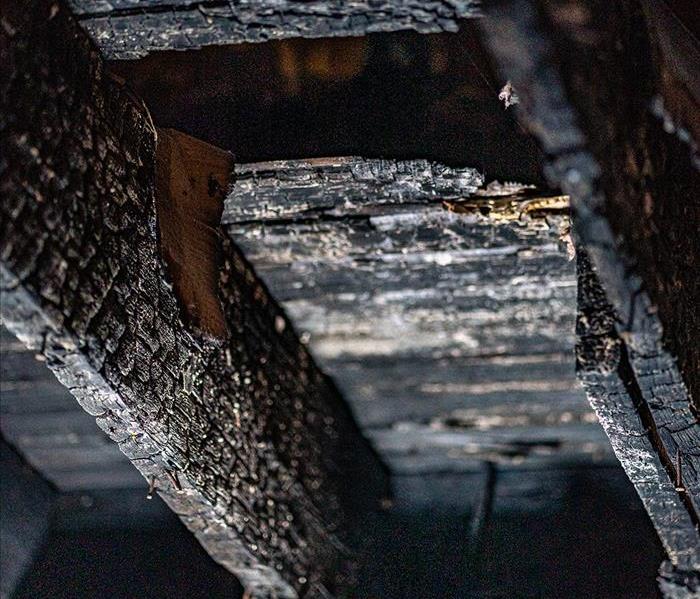 Severe fire damage in Brookhaven, GA.
Severe fire damage in Brookhaven, GA.
What Does Board Up Services Mean
When your home has sustained fire damage in Brookhaven, GA, your first priority is to get your family settled in a safe place, not worry about your damaged home since it will be a while until everything can be repaired. Despite the challenges you're likely facing as you recover from this disaster, properly securing your home is important. One of the first things that will be recommended by a fire damage restoration company is an emergency board up service. This service is an important part of your home restoration for several reasons.
1. Insurance
Most likely, your insurance company will require that your home is properly sealed in between the occurrence of the damage and when the repairs are done. Insurance pays for what is originally quoted, and if more damage is done, you'll have to pay more.
2. Liability
If your home isn't properly secured by a board up service, anyone who enters your home and gets injured could press charges.
3. Damage
Further damage from weather, animals, or humans makes an already difficult situation worse. Securing your home prevents most of the additional damage.
4. Property Loss
An open home is an open invitation to people who want what you have. While you may think there isn't much left, anything from appliances to pipes to your HVAC system can be stolen for profit, leaving you to foot the bill.
5. Professionalism
When you trust a company to do the board up service for you, you can be confident that it will be done correctly. DIY may sound simple, but in addition to being a two-person job, you can cause more damage by improperly placing boards or your efforts simply aren't effective because you're not using the right materials.
Securing your home with a board up service after a fire is not only recommended by most insurance companies, but you can have peace of mind knowing that your home will be protected until the restoration is complete.
Mitigation and Restoration Are Essential Stages of Water Damage Cleanup
3/30/2021 (Permalink)
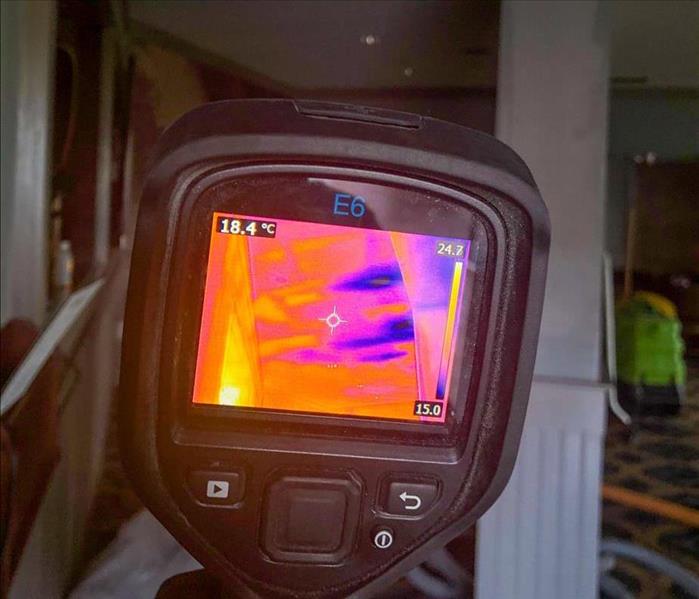 Assessing the area with a thermal imaging camera.
Assessing the area with a thermal imaging camera.
When a flood cleanup company examines a water-logged facility, the team should discuss two cleanup stages: mitigation and restoration. What are they different, and why are both vital to repair? It's probably tempting to dry everything out move on, but the specialists should explain that in cases of water damage, that effort isn't enough. Owners must consider both phases because prevention and rebuilding are vital to securing the area. Collaborate to establish a plan of action that gets your operations back up and running without concerns of future issues like mold growth.
What Happens During Mitigation?
When the storm ends, and the water recedes, a restoration company should immediately attend to the property. The fluid from rain and floods permeates into porous materials. This lingering moisture, if not appropriately treated, permits mold, mildew and bacteria to develop. Rot and structural integrity could also become issues as wood and ceilings. The goal of mitigation is to reduce the likelihood of these secondary conditions.
A flood cleanup company in Brookhaven, GA works with certified environmental specialists to assess the premises, testing to determine where contamination exists and how to treat it best. Within hours, the crew begins drying efforts. The workers should complete the following actions:
- Pull up saturated carpet
- Remove damp objects for content cleaning
- Toss soiled valuables
- Run industrial dehumidifiers
- Perform necessary flood cuts
Once the room is dry, the team scrubs the walls and sanitizes with antimicrobial spray.
How Is Restoration Different?
While the early efforts focus on minimizing further concerns, the restoration company concentrates on mending the physical structure. This part of the project is slower. In remediation, crew members accomplish tasks at the same time. During the restoration, workers rebuild. Often, workers complete one thing before moving on to the next. Staff members replace anything pulled out, patch the walls and add a coat of paint. They also return any valuables that they salvaged.
A flood cleanup company understands that preventative measures are necessary. Their efforts with mitigation save owners future hassles. It's tempting to want to dry and paint, but taking time to care for the space is vital.
4 Steps To Take After a Toilet Overflow
3/9/2021 (Permalink)
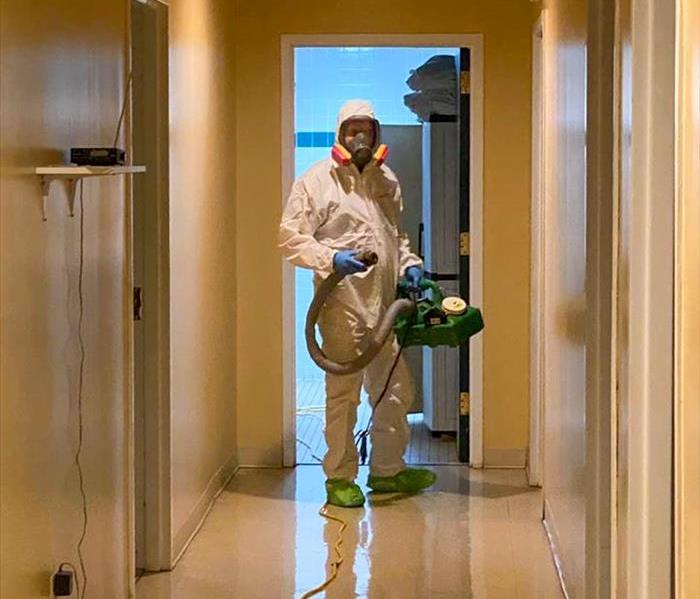 A toilet auger can be used to dislodge the clog.
A toilet auger can be used to dislodge the clog.
Here Are Four Steps To Take After A Toilet Overflow
Water should be considered a major enemy to your Brookhaven, GA home because of the sheer amount of damage it can cause. Sewer damage can be especially alarming, and no one wants to hear the sound of water sloshing to the floor in the bathroom. What should a homeowner do when the water starts gushing over the rim of the toilet bowl?
1. Turn Off the Water
Shut the water off the moment you sense the toilet might overflow. Most toilets have a water supply valve located on the wall behind the toilet. The valve is generally shaped like a football and is attached to the pipe or hose underneath the toilet tank. Turn the valve clockwise until you can’t turn it anymore. Alternately, you can turn off the main water supply to your home.
2. Plunge the Clog
Once you’ve shut the water off to the toilet, begin plunging the clog. Vigorously push the plunger up and down to clear the clog. It’s wise to place some old towels around the bottom of the toilet to catch any water that may land on the floor. Remember, sewer damage should be considered an emergency situation because of potential bacteria and viruses in the water.
3. Use a Toilet Auger
If a plunger doesn’t work, a toilet auger can be used to dislodge the clog. First, place the hook end of the tool into the drain hole. Next, turn the crank clockwise until it stops. This generally indicates that you’ve reached the cause of the clog. Finally, pull back on the auger and turn the crank counter-clockwise. The pulling and cranking should release the clog.
4. Call Emergency Professionals
If you feel inadequate at performing any of these steps, a professional sewage company can assist you. In fact, it’s wise to enlist the help of professionals who have the right equipment and protective gear to handle sewer damage.
A flooded toilet is an emergency situation that most homeowners will face at some point in their lives. Follow these steps to properly handle a toilet overflow.
3 Advantages of Using Professional Storm Services
2/19/2021 (Permalink)
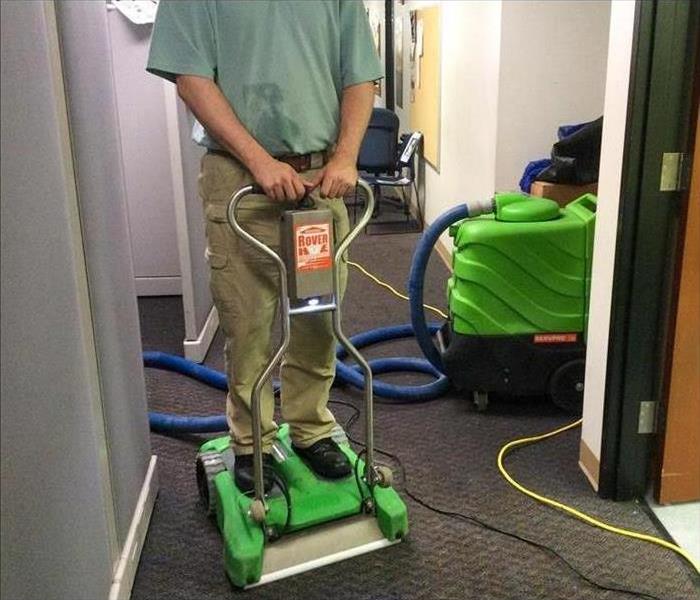 Professionals know the best methods for drying, sanitization and restoration.
Professionals know the best methods for drying, sanitization and restoration.
3 Advantages of Using Professional Storm Services
Hurricanes, typhoons, heavy gusts, tornadoes, snowstorms, flooding and other weather-related disasters in Brookhaven, GA have the potential to cause severe structural damage and create big messes. The National Oceanic and Atmospheric Administration, or NOAA, reports that between 1980 and 2020, the U.S. has experienced 285 such incidents where costs hit or exceeded $1 billion. The combined total expense of storm restoration, storm response and repairs for these events is over $1.875 trillion.
Insurance companies provide much of the funds required for fixing flood damage and other harm done to commercial properties. It is advantageous for them to employ the services of a professional storm company for multiple reasons.
1. Faster Response
Situations needing storm restoration generally worsen as time passes. Water damage especially tends to spread, promoting mold growth and rendering certain items irreparable as they become saturated. Drywall, carpeting and other building materials often have to be thrown away in the wake of a deluge but may sometimes be preserved if swift action is taken. A faster response results in numerous benefits, including:
- More possessions can be salvaged
- The advance of damage is slowed or halted
- Cleaning costs are lower
- Restoration costs are lower
2. Quality Service
Professionals are trained to provide quality aid. They are capable of identifying existing issues, assessing the extent of the damage and prioritizing what needs to be done. They know the best methods for drying, sanitization and restoration.
3. Resource Availability
Storm response services also possess the necessary resources to get the task done. There are teams of experienced experts ready to mobilize at any given moment. They also have the tools needed to effectively perform their tasks readily at hand.
Having a storm restoration business on call also speeds up the claims and restoration process. Professional teams can help owners create itemized lists of needed replacements and repairs and evaluate and record damage. They also mitigate the impact of disasters.
3 Ways To Conserve Water
2/11/2021 (Permalink)
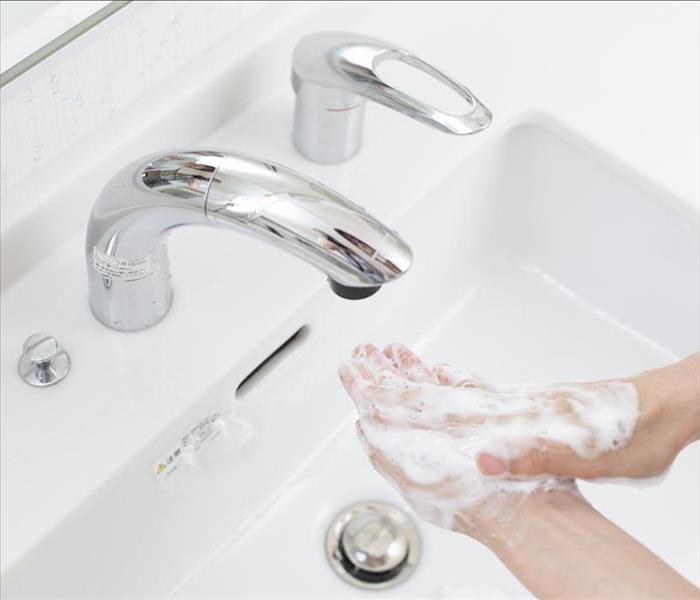 Install touch-free faucets.
Install touch-free faucets.
Three Ways To Conserve Water
Water issues in your community may have you looking for ways to cut costs and conserve water at your business in Brookhaven, GA. Not only is this good business sense, it's good for the environment, but it can be hard to know what to do.
1. Replace Faucets
Especially in a large office building, a lot of water gets used in bathrooms and kitchens. One water upgrade that will actually lower your monthly bills is to install touch-free faucets. The initial cost may be high, but the faucet won't be left running by a forgetful employee, and the upgrade will pay for itself over time. A less costly option is to replace the aerators on your faucets. Lower pressure means less water consumption. Hands still get clean, but you can save gallons of water.
2. Manage Irrigation
When does your irrigation schedule change? If the answer is "Never," it's an easy fix that will definitely save money and conserve water. There's no need to run the irrigation system during a rainy season. Even in dry seasons, you may not need to run the irrigation for as long as you think. The best way to decide this is to sub-meter your irrigation system so that you can see exactly how much water is being used for the plants. Try running the irrigation for ten fewer minutes at each session. If your plants don't die, you've found a way to save.
3. Check for Leaks
One major source of costly water issues is invisible leaks. There may be a single toilet in the building that runs all the time or a pipe deep in a wall that has developed a leak. If your water bill begins to creep up inexplicably, call a water damage restoration specialist to inspect your building. If they discover a leak, they will talk you through the process of getting it repaired, saving money and conserving water.
You care about the water issues in your community, your bottom line, and the environment. These tips can save money and conserve water for the benefit of your company and the community.
Does Commercial Insurance Cover Mold Damage?
2/2/2021 (Permalink)
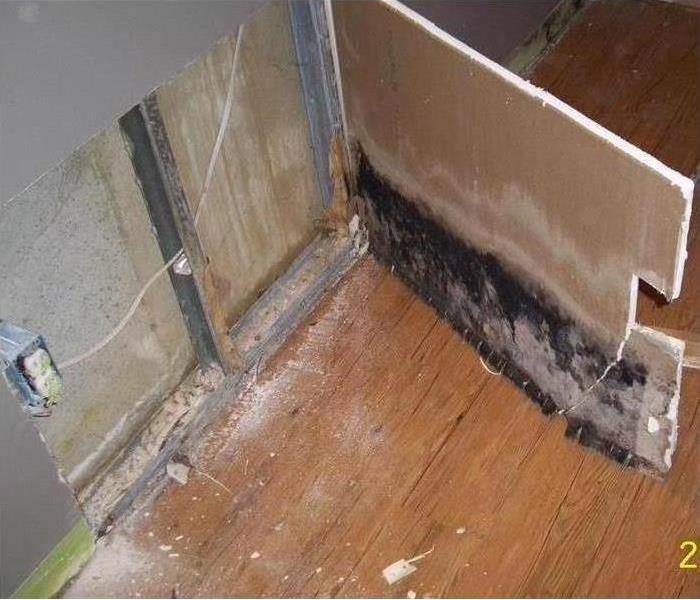 Mold growth from moisture in Brookhaven, GA
Mold growth from moisture in Brookhaven, GA
Water damage from storms, floods and leaks can cause significant damage to your property. To make matters worse, the moisture from these events also provides a fertile breeding ground for mold. If your property has suffered water damage, you should review your commercial insurance policy to see what coverage is provided for mold.
Why Mold Is a Problem
Many people may see mold as primarily an aesthetic issue and focus on getting rid of the stains and smell. However, mold damage is a serious problem for several reasons:
- Can grow on almost any surface
- Often grows under floors, behind walls, in ducts, behind ceiling tiles and other places where it isn't visible
- Feeds on the material it grows on, which may damage or destroy it
What Commercial Property Insurance Covers
Most commercial insurance policies include a fungus exclusion that eliminates coverage for damage caused by the growth, proliferation, presence, or spread of bacteria, fungus and wet or dry rot. Mold, mildew, spores, toxins, by-products and scents produced by fungi are included in this exclusion.
The standard ISO commercial policy contains three exceptions to the fungus exclusion. Mold that occurs because of fire or lightning is covered. A specified cause of loss that occurs because of fungus is covered. Finally, mold that occurs because of a specified cause of loss other than fire or lightning is covered by mold insurance, called Limited Fungus Coverage.
How Limited Fungus Coverage Works
Limited Fungus Coverage applies when a specified cause of loss results in mold. For example, if you have a broken pipe and the water damage from that pipe causes mold, then the cost of removing the mold or repairing any damage caused by the mold is covered up to the $15,000 limit.
Though commercial insurance policies broadly exclude coverage for mold, if the mold occurs due to a covered cause of loss, limited coverage applies in most policies. An insurance professional in Brookhaven, GA can help you review the specific coverages in your policy.
How Do Experts Restore Fire Damage?
2/2/2021 (Permalink)
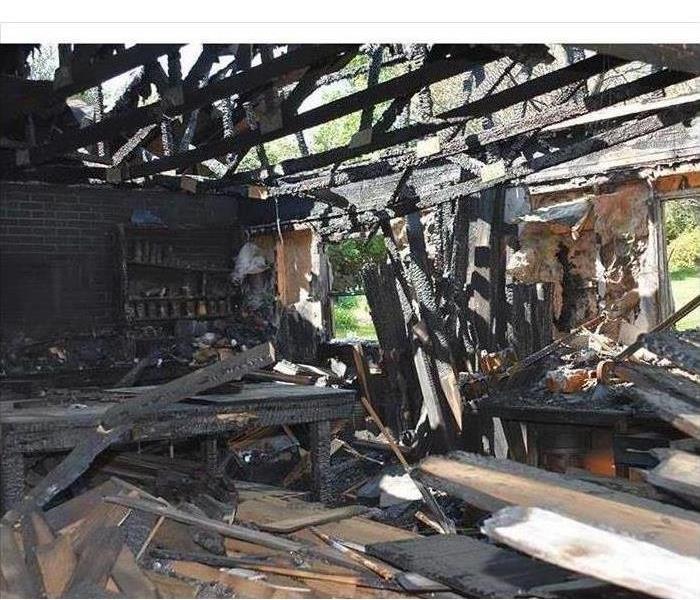 Fire damage in Brookhaven, GA
Fire damage in Brookhaven, GA
Four Stages of Fire Restoration
A home that has recently sustained damage from a fire should be cleaned and restored by certified professionals. This process starts with damage cleaning and continues through rebuilding to the finishing touches. Learn more about the four stages of fire restoration.
1. Inspect
Experts will examine the location of a fire to determine which building materials and contents need to be cleaned or replaced. This assessment will also identify the mitigation measures that should be taken and the scope of restoration. An all-in-one company can provide a verbal briefing within hours after inspecting damage followed by a single estimate that accounts for mitigation and restoration.
2. Mitigate
Mitigation should begin as soon as fire damage specialists have a clear idea of the extent of damage and homeowners have photographic or video evidence to provide to an insurer. The primary goal of this phase of the process is to prevent damage from getting worse prior to cleaning and restoration. Mitigation may involve boarding up broken windows or structural breaches, tarping over holes in the roof or putting up security fencing.
3. Clean
Cleaning is a critical step toward fire restoration. Professionals use commercial-grade equipment to remove soot and any standing water remaining after fire suppression. After eliminating water and debris, experts may tear out damaged building materials or wipe down stained surfaces. Restoration can proceed after cleanup is complete.
4. Restore
Restoring a fire-damaged residence can range from cleaning and replacing a few components all the way to a full rebuild. This process may take days or weeks, depending on the extent and severity of the damage. Finishing touches may include cleaning smoke damage and odor mitigation.
Homeowners should rely on a one-stop shop that provides all of these services with a single estimate and schedule. Insurance companies prefer to work with an IICRC-certified fire restoration company located in Brookhaven, GA.
3 Reasons You Should Not Drive Through Flooded Streets
1/15/2021 (Permalink)
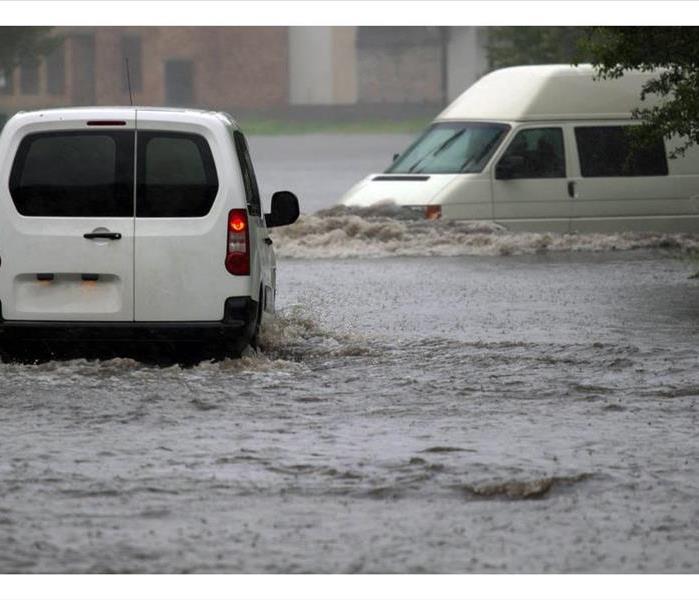 Driving on a flooded street puts you and your passenger at risk
Driving on a flooded street puts you and your passenger at risk
Three of the Reasons You Should Not Attempt To Drive Through Floodwaters
One of the most common risks associated with flash flooding is drivers attempting to drive through water on a flooded street.
1. You Don't Know What Is Under the Water
Flooded roads may have debris, depressions or areas that have been washed away that you can not see because they are covered by water. Attempting to drive through what may appear to be shallow water could lead to a collision with an object under the water, losing traction and sliding off a washed-out road, or driving into water that is much deeper than it appears.
2. The Water Can Damage Your Car
Another reason not to drive down a flooded street is that the water can damage your car. Water that is six inches deep can flood the exhaust of your vehicle and cause it to stall. The water may also damage the engine, transmission, cooling and electrical systems of the vehicle. If the water is deep enough, it may cause interior damage to the floorboards, seats and other surfaces that will need to be professionally cleaned to avoid mold growth and other problems.
3. You Could Drown
About half of all flood-related drowning deaths occur because of drivers attempting to drive through floodwaters. Six inches of water can cause your vehicle to lose traction with the road. 12 inches of water will cause most cars to float. Large trucks and SUVs will float in two feet of water. Passengers in a car that gets swept off the road by floodwaters are at a high risk of drowning, which is why travel tips for Brookhaven, GA advise drivers to turn around instead of driving through floodwaters.
Attempting to drive down a flooded street puts you, your passengers and your vehicle at risk. For these three reasons, do not attempt to drive through floodwaters.
How To Handle A Leaking Light Fixture
12/28/2020 (Permalink)
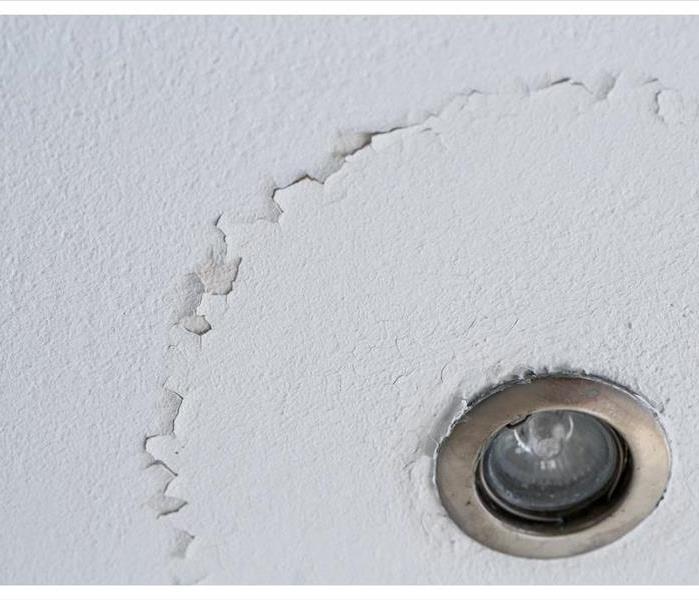 Water and light fixtures are a dangerous combination
Water and light fixtures are a dangerous combination
Here Is What To Do Instead Of Trying To Fix It Yourself
Short of a burst pipe or overflowing dishwasher that suddenly floods your home, water damage is often difficult to detect until extensive damage has occurred. One clue that you may discover first is pooling water in light fixtures. If you see this in your home, do not try to fix it yourself. Water conducts electricity, so water and light fixtures are a dangerous combination.
1. Turn Off Electricity and Water
Since you can't know the full extent of the ceiling damage and how much of your electrical system has been compromised, turn off the power to that affected region of the house as well as the water supply. Turning off the water supply will prevent additional water from building up in the light fixture. Alert anyone living in your household to the danger that you've discovered so that no one flips the breaker and gets hurt.
2. Call A Water Damage Specialist
A local water damage remediation specialist in Brookhaven, GA will be able to help you determine the extent of water damage in your home. They have special tools that allow them to measure the wetness levels in ceilings and drywall so that they know which areas need to be addressed rather than tearing down walls only to discover that there is no damage.
3. Work with an Electrician
Once a water damage remediation team has evaluated your home, they will be able to connect you with an electrician who can handle the water in light fixtures. The electrician will be able to safely remove and replace the fixtures as well as any wiring that has been compromised.
It seems ironic to advise that burns and electrocution are possible dangers of water in light fixtures, but those are most certainly safety hazards that you might face. Allow the professionals to handle this water damage cleanup for the safety of you and your family.
Who Pays for Fire Damage in a Rental Property?
12/28/2020 (Permalink)
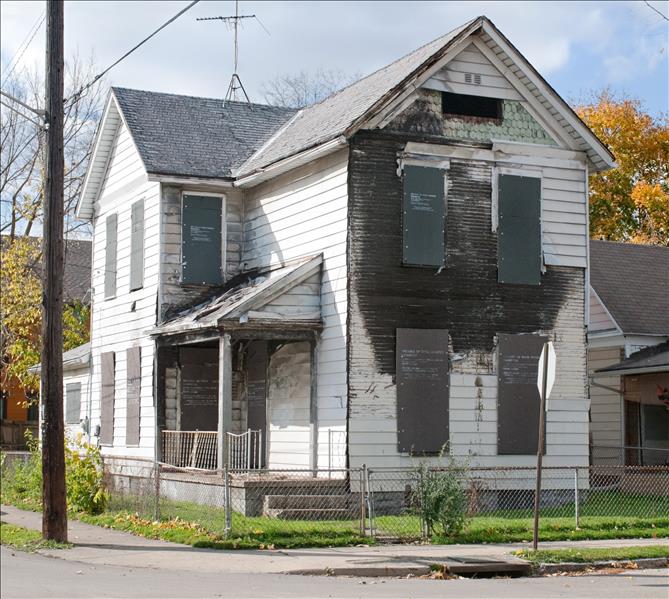 Fire damage in Dunwoody, GA
Fire damage in Dunwoody, GA
"I love when the sink breaks!" said no one ever. Depending on your handyman skills, making unexpected repairs around the house can be one of the downsides of homeownership. The great thing about renting in Dunwoody, GA, is that there are things no one expects you to fix or pay for. In many rentals, tenants do not have to pay for household repairs from normal wear such as broken sink or toilet. Instead, when these situations occur, landlords expect renters to call a maintenance person who the rental property pays. But what if you are a tenant who experiences an apartment fire? Who pays for the damages then?
Who Is Responsible?
Here is the thing about fire damage: Landlords hold ultimate responsibility for all repair costs, but there are three things to consider:
- Who / What Caused the Fire?
- Who Has Insurance?
- What Is the Damage?
While damages can be expensive, most landlords have insurance policies that keep them from having to pay for repairs out of pocket. The insurance company will seek to work with the insurance company of the tenant, depending on if the tenant has renters' insurance. If it is clear tenants have caused the apartment fire, they will be responsible for paying. The loss of personal items such as household goods and furnishings falls on whether tenants have any sort of protection coverage on the unit.
How Do Landlords Repair Damage?
Whereas tenants have to focus on the loss of personal belongings, property owners have to focus on repairing the damages to the building. When it comes to repairing fire damage, there may be several things you need to address. From inspection and assessment to removal of smoke and soot, you will need a fire damage remediation expert to help you take care of everything that comes after. It is important to keep in close contact with your insurance company throughout the process.
In the event of an apartment fire, landlords have the responsibility to make repairs, but the party responsible for paying can depend on the specific circumstances. It may be worth looking at your property or renters' insurance to see what it says.
4 Steps to Recover Water-damaged Electronics
12/15/2020 (Permalink)
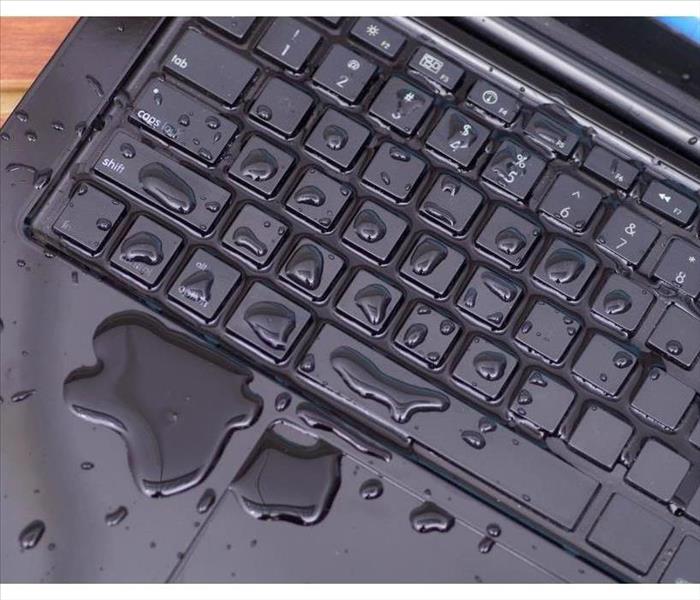 Flooded electronics can be saved
Flooded electronics can be saved
Steps To Save Your Flooded Electronics
Has your commercial building in Dunwoody, GA, had electronic damage? If your building is equipped with any type of electronic device, it's best to be informed about what steps you can take to save your flooded electronics.
1. Exercise Caution
The first step before dealing with any mix of electricity and water should be to ensure your own personal safety. Consider putting on rubber boots or gloves if entering an area where water and electricity might be mixing. If you're uncertain, it's always best to go with the safer option of contacting a water damage cleanup specialist.
2. Unplug
After first ensuring that you will be entirely safe while doing so, the next step is to disconnect the flooded electronics from any power sources. For computers or other electronics that are plugged into the wall, you can simply unplug them. However, it is first recommended to locate a breaker panel or circuit breaker and shut off everything from there.
3. If Applicable, Remove Battery
If the device has a battery installed, exercise extreme caution when removing the submerged device. The chemicals in batteries can be dangerous for a multitude of reasons, and a wet battery can also catch fire. If you see any smoke, bubbling, or evidence of melting parts, do not handle the battery: call a professional.
4. Drain the Device
If it was safe to remove the device from the water and unplug it, the next step is to get as much of the water out as possible. Contrary to popular belief, soaking your device in a rice bag does not help. While it may absorb the water, rice leaves behind all the chemical contaminants that may have leaked out of any components. Instead, disassemble the device and individually dry each component with a microfiber cloth. If it cannot be disassembled, you can also shake the device.
While it can seem hopeless, with the right steps and some professional help, flooded electronics can be saved.
3 Reasons Why Desert Climates Are Susceptible To Mold Growth
12/8/2020 (Permalink)
Here Are Three Reasons Why Desert Climates Are Susceptible To Mold Growth
The accumulation of black mold is a strenuous occurrence for any building owner in Dunwoody, GA. However, it can also be a confusing one. Those who work in desert climates don't tend to expect mold issues. After all, the substance thrives on dampness and water. These aren't things the desert has in spades. Unfortunately, it's certainly possible that desert-based buildings may need mold removal.
Maintenance
The mindset that desert climates don't experience black mold is often what causes this issue. Proper maintenance in said area may be neglected, which results in problematic water buildups. These are structural issues that desert building owners don't often look for:
- Air-conditioning condensation problems
- Building holes
- Leaking water
- Weather stripping failures
Forgetting about the possibility of these maintenance issues can cause substantial mold growth. This is why fixing said problems should be a priority after the fungus is detected.
Heat
Deserts aren't exactly the most humid areas, so it may seem odd that the climate would encourage mold growth. However, the heat can become a potent creator of the substance. Water isn't nonexistent in the desert. At some point it will rain or structural leaks will occur. If the resulting water isn't properly removed, the intense desert heat may trigger the swift and substantial creation of said fungus. This can make the mold cleanup process worse than normal due to excess growth.
Wind
A desert climate may not experience bountiful rain, but it does tend to have intense wind. This wind can cause damage to the structure of your building. If the damage results in holes or broken pipes, you could need mold remediation experts shortly. In fact, it's highly possible that any holes would be too small to catch easily but large enough to accumulate water.
Expecting the unexpected is an important doctrine, even when the unexpected seems outlandish. Any building owner should prepare for black mold, even one in the desert.
3 Possessions You Might Have To Trash After a Fire
12/8/2020 (Permalink)
 Medicines are also susceptible to high heat, smoke, and fire
Medicines are also susceptible to high heat, smoke, and fire
Items You Have To Throw Away
According to the National Fire Protection Association, or NFPA, in 2019 out of all the fires reported 27% were home fires. Fires can wreak havoc on structures, completely gutting them. They also often result in high heat, smoke and fire damage to the contents of homes. However, not all fires result in complete and utter devastation with little left to salvage. Sometimes there is a great deal that can be saved with the aid of a professional cleanup and restoration service in Dunwoody, GA. However, there are certain items you are likely to have to throw away.
1. Fabrics
Sheets, blankets, and clothing are often recoverable in the wake of a fire. Proper disinfection and cleaning can usually restore fabrics and textiles for use. However, this generally only applies to non-burnt items. Clothes or bedding that have been burned should be thrown away.
2. Food
You might have to throw away food, both perishables, and non-perishables. Some foodstuffs like those in open containers or charred cardboard boxes are obviously on the disposal list. However, even supplies sealed in cans or jars may have been rendered inedible by the presence of bacteria whose growth was spurred on by high heat. Refrigerated and frozen food occasionally survives in good condition, but if you notice any of the following signs, it is best to discard the contents of your fridge or freezer:
- Soot in the fridge
- A strange smell coming from food
- A smoky odor in the fridge
- Freezer food is soft without visible ice crystals
3. Makeup and Medicine
Cosmetics and medicines are also susceptible to high heat, smoke, and fire. Any sign of damage, like charring, warping, or fire extinguisher remains are indicators that you need to get rid of products in these categories. They are no longer usable.
While not all possessions in the aftermath of fire are ruined, the ones listed here are commonly beyond saving. If you observe any of the signs listed here, you should throw away the things displaying them.
Is Mold Damage Covered by my Insurance?
11/24/2020 (Permalink)
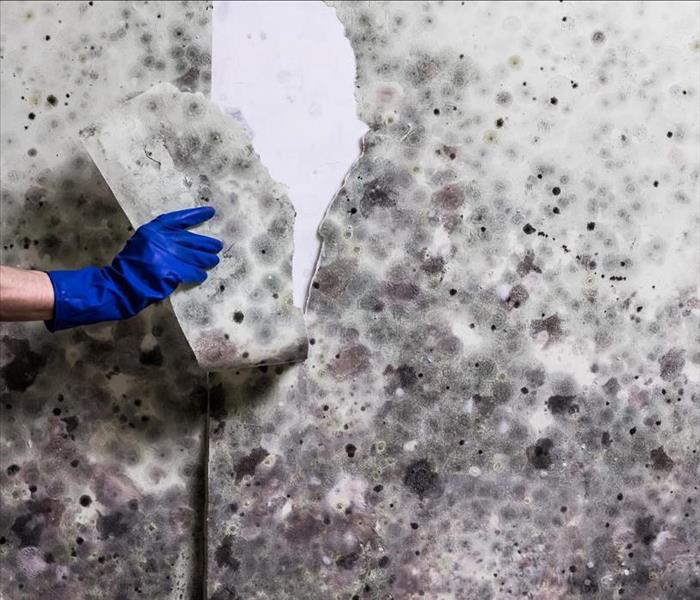 Mold removal in Brookhaven, GA.
Mold removal in Brookhaven, GA.
One thing that many homeowners don't understand about their insurance coverage is that an essential part of having that insurance is preventing risk, such as damage from fungus growth. When you sign up for an insurance policy, you are entering into an agreement that you will properly maintain your home and property, and the insurance company will protect you from financial loss.
Questions That Affect Coverage
When you find fungus growth in your home and wonder whether professional cleanup and removal is covered by your insurance company, you'll need to answer some important questions:
- What caused the mold growth?
- Could the damage have been prevented?
- Did you neglect maintenance issues that led to fungus, mold, or mildew?
If the insurance provider finds that mold occurred because of steps you should have taken but didn't, the damage probably won't be covered.
Examples of Non-Covered Situations
Here are some examples of situations that your insurance policy probably won't cover:
- A pipe burst in the basement that wasn't probably handled
- An aging roof that allows water into the attic and structure of your home
- Visible signs of mold that you don't do anything about
- Residential flooding that isn't specifically covered by your insurance
Some policies do cover mold claims, but you need to be sure that there's specific language about it in your policy.
Covered Perils and Further Responsibility
You may receive mold coverage if the source of trouble falls under the "covered peril" window. Mold insurance coverage is generally available after fires, lightning strikes, vandalism, the weight of snow or ice, and accidental discharge of plumbing, sprinkler systems, and household appliances, for example. When a "sudden and accidental" incident takes place, you need to contact your insurance provider quickly because a delay in taking action could prevent coverage.
The best way to be sure that your insurance covers damage due to mold or fungus growth is to read your policy and speak to your agent. You should also understand the limits to the mold coverage. Your provider may also give you advice about how to avoid risks associated with mold in your Brookhaven, GA home.
Understanding if Carpet Can Be Saved After a Pipe Breaks
11/23/2020 (Permalink)
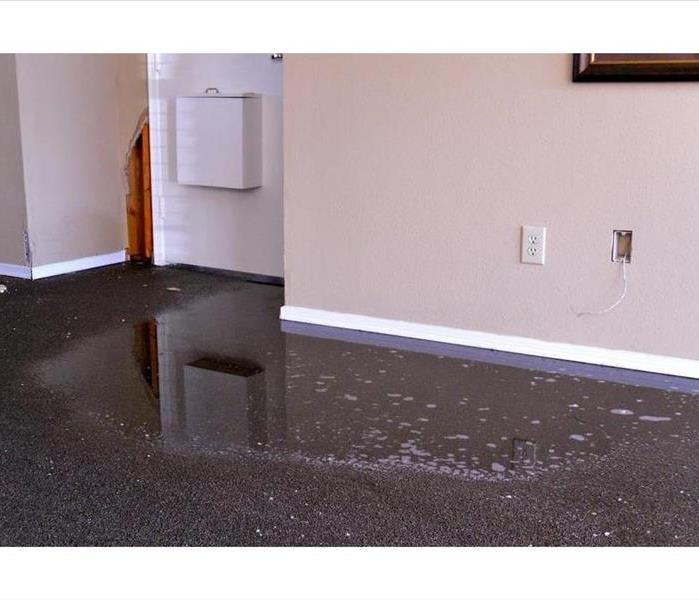 Carpet damaged by water
Carpet damaged by water
Tips To Help You Understand If Your Flooring Is Reclaimable
It’s safe to say that no homeowner welcomes the presence of unexpected water. Intruding water is commonly seen as an enemy due to its swift-moving and damaging nature. Fortunately, there are cleanup specialists who can assist with water damage cleanup. If you experience a pipe break, storm or overflowing sink in your Dunwoody, GA, home, you may be wondering if you can recover wet carpet.
Categories of Water
It’s essential to identify what type of water has caused damage in your home. The Institute of Inspection, Cleaning and Restoration Certification has classified the following categories of water:
- Clean water
- Gray water
- Black water
Category one, or clean water, is classified as such because it does not contain harmful contaminants. Examples for this category include water from sink overflows, appliance malfunctions and a pipe break. Category two water, or gray water, comes from sources such as urine from toilet bowls and sump pumps. Category three, or black water, is totally unsanitary and includes sewage water and ground surface water. If the water in your home is from a category one source, your carpet might be saved.
Proper Cleanup
It’s imperative that homeowners enlist the help of a certified cleanup company to guarantee that water is properly removed from their homes. There are specific steps to follow in water damage renovation including inspection, water extraction, drying, cleaning, sanitizing and restoration. During each step, professionals use specific equipment and procedures. Mold is a common concern when water accumulates. Experts can use advanced equipment to detect hidden moisture and identify any mold issues. By acting quickly, professionals can minimize the extent of water damage in your home.
A pipe break or unexpected storm is cause for serious concern. Fortunately, damage is minimized with the help of professionals who can salvage carpet if the water came from a clean source.
What To Know About Partial Fire Losses
11/11/2020 (Permalink)
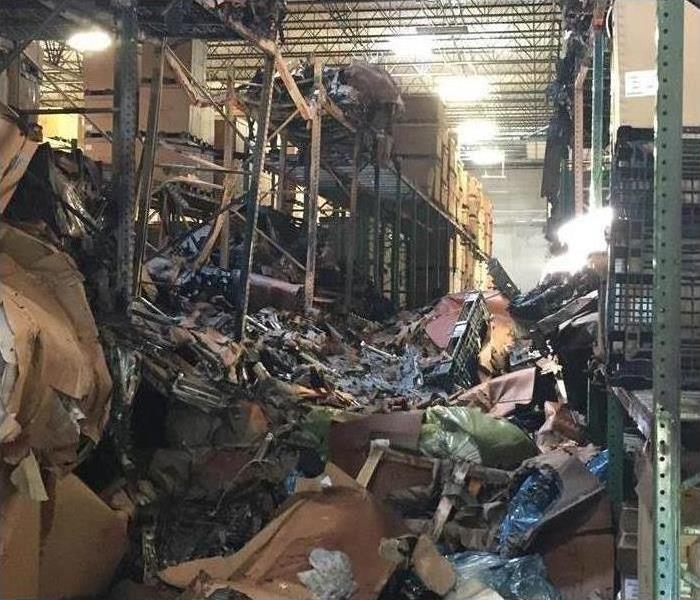 Partial fire loss in Brookhaven, GA
Partial fire loss in Brookhaven, GA
Ways To Handle Fire Damage
Not every fire completely destroys a property. You could instead end up with a partial fire loss. Here are some tips for handling this type of loss.
Inspections
Even if you only suffered a partial loss to your commercial property, you should hire structural engineers or contractors to survey the building and estimate the costs of repairs. Do not rely on the insurance adjuster's inspection alone. Choose a specialist who will survey each of these areas:
- Windows
- Structural iron and steel
- Heating and plumbing systems
- Roof
- Interior walls
- Siding, concrete and stucco
Smoke Cleanup
A partial loss often includes ash and smoke damage. Smoke can harm porous items, including curtains and rugs. It can also discolor tiles and marble.
Fire restoration professionals in Brookhaven, GA, should be able to repair some of these items. You may have to replace other things, however. Either way, your insurance may help you pay for the fire loss.
The insurance adjuster may tell you that a deep cleaning is not necessary. However, this is just the insurance company's way of trying to save money. Insist on a thorough remediation.
Mold Cleanup
The water used to suppress the fire can cause mold growth inside wood and drywall. Get the property inspected right away to see if you have a mold problem. You should also check your insurance policy to find out if it has a mold exclusion.
Landscape Cleanup
Insurance does not just apply to the inside of your commercial property. The smoke and heat may contaminate soil and kill your outdoor plants. Harmed plants may not die right away, so keep your insurance claim open for a few months after the fire.
A partial fire loss can include smoke and soot damage. Your landscaping could be harmed, as well. Thankfully, you can use your insurance to pay for some of these repairs. The above tips should help you get your property back to normal as soon as possible.
How To Identify and Avoid Secondary Water Damage
11/11/2020 (Permalink)
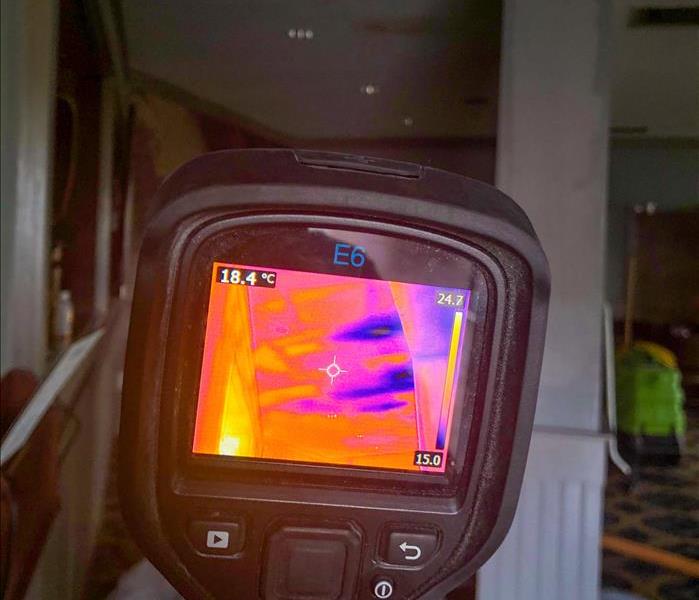 Mold can quickly grow after a water loss.
Mold can quickly grow after a water loss.
How Secondary Damage Occurs And How To Handle It
When a basement or a showroom floor floods in Dunwoody, GA, rapid response is key. Most insurance policies cover the original damage, but they may not cover the cost of additional damage after the initial incident. If you do not properly address the source of the water damage, secondary damage like black mold could become an expensive complication. Understanding how secondary water damage occurs can help you prevent it during the initial clean-up effort.
Causes
Humidity is the main driver of damage that happens after the primary water damage. When the air in a water-damaged building becomes saturated, it becomes excessively humid. This high humidity can lead to further damage in the initially exposed areas and to areas that were not originally affected. This is often the result of:
- Failure to promptly repair primary water damage
- Inadequate dehumidification procedures
- Inability to address underlying or unknown sources of remaining moisture, such as burst pipes
Signs
Growth of black mold on walls or ceilings, or even baseboards and floors, is evidence that the original damage has not been adequately cleaned or repaired. Buckling hardwood, peeling laminate or vinyl flooring, and sagging or cracking drywall can also result from extremely high humidity, which indicates secondary damage.
Prevention
Keeping secondary damage to a minimum requires a multi-pronged approach, the goal of which is to minimize further exposure to water and humidity:
- Stop leaks from burst pipes and address any other leak sources
- Drain all standing water
- Ventilate the building by keeping windows and doors open as long as possible
- Install dehumidifiers in areas like basements where airflow is problematic
- Remove all items other items, including drapes, furniture and carpeting until the space is completely dry
Water damage can happen to anyone. However, secondary damage in the form of black mold or sagging drywall can be avoided. With the right knowledge and help from water damage restoration professionals, your business can fully recover on the first try.
Does My Storm Damage Qualify For a Tax Deduction?
11/11/2020 (Permalink)
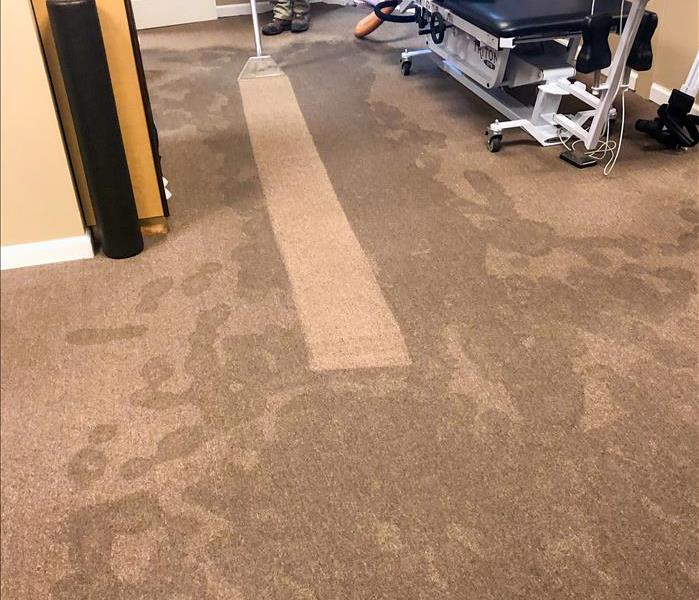 If you think your storm damage is tax-deductible, be sure to have proper documentation to back up your claims and calculations
If you think your storm damage is tax-deductible, be sure to have proper documentation to back up your claims and calculations
Use This Four-Step Checklist To See If Your Damage Is Likely To Be Tax-Deductible.
If you experience storm damage to your business property or other commercial building, you may be able to deduct some of your losses on your income tax return.
1. Did the Storm Cause Damage to Your Business Property?
Property damage caused by a storm or other disaster is considered a “casualty loss” under Section 165 of the Internal Revenue Code. For commercial property, you can deduct an amount equal to the reduction in the property’s market value as a result of the damage; in other words, the property’s value right before the storm, minus its value right after the storm.
Most people don’t have appraisal figures for right before and right after a storm. Instead, the IRS allows taxpayers to add up the total cost of repairs and storm restoration expenses to calculate the deduction amount.
2. Was the Damage Covered By Insurance?
Insurance coverage is not a requirement for deducting casualty losses; however, if your property was covered by insurance when the storm hit, you must have filed an insurance claim for the storm damage to be considered deductible. You must subtract any insurance payments you received for the damage from your claimed deduction amount.
3. Was the Property Within a Federal Disaster Area?
If the damaged property was within a federally declared disaster area at the time of the loss, there may be additional deductions available. Check FEMA’s website to see disaster information for Brookhaven, GA.
4. What About Other Losses?
Some additional storm-related losses, like destroyed inventory, may be deductible as business expenses under Section 162. Some expenses which are not tax-deductible include
- intangible losses, such as lost income
repair costs for damage caused by ordinary - wear and tear
- losses due to looting or theft
If you think your storm damage is tax-deductible, be sure to have proper documentation to back up your claims and calculations. If you’re unsure, it’s best to consult a tax professional.
No Flood Insurance? Here's How To Get Help
10/20/2020 (Permalink)
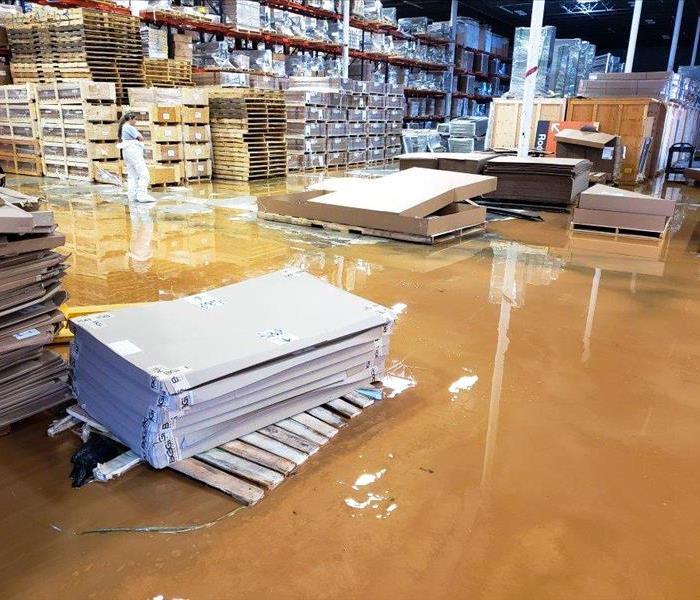 Flooded warehouse in Dunwoody, GA
Flooded warehouse in Dunwoody, GA
The best way to protect your household if a flood event occurs in Dunwoody, GA is to purchase flood insurance. However, if you have flood damage and no insurance coverage, some relief options are still available.
Disaster Loan From the Small Business Administration
The Small Business Administration, or SBA, provides low-interest loans to assist in recovery from a declared disaster for the following people:
- Homeowners
- Renters
- Business owners
You don’t need to be a business owner to apply for a disaster loan from the SBA. You will need to prove that the flood damage is not covered by insurance. Maximum interest rates range between 4% and 8%, depending on your eligibility for credit elsewhere. You’ll need to complete and return a loan application. If the SBA determines you are not eligible for a loan, you’ll automatically be referred to the Federal Emergency Management Agency's Individuals and Households Program.
FEMA Individuals and Households Program
The FEMA IHP provides both financial and direct services to individuals and households who have uninsured or underinsured expenses and serious needs. Those who receive a grant and do not have flood insurance will not have to pay it back. If you have insurance, you are required to pay back the grant but may use the insurance money to do so.
IHP assistance may be used for temporary housing such as rental assistance or hotel expenses, funds to replace, repair, or provide storm damage restoration services of primary residences to make the home safe to live in, and other serious needs such as moving and storage, medical care, and child care.
Private Insurance
If you’re concerned about a future flood event or live in a flood plain, private insurance often has a short waiting period of 10-14 days. However, you cannot purchase insurance to cover an event that has already happened. If you have previously had flood and water damage to your residence, seriously consider purchasing insurance to protect you in the future.
The best time to consider disaster services is before a flood event occurs, however, if you don’t have flood insurance, other options are available to you.
Top 5 Hidden Places to Find Mold
9/30/2020 (Permalink)
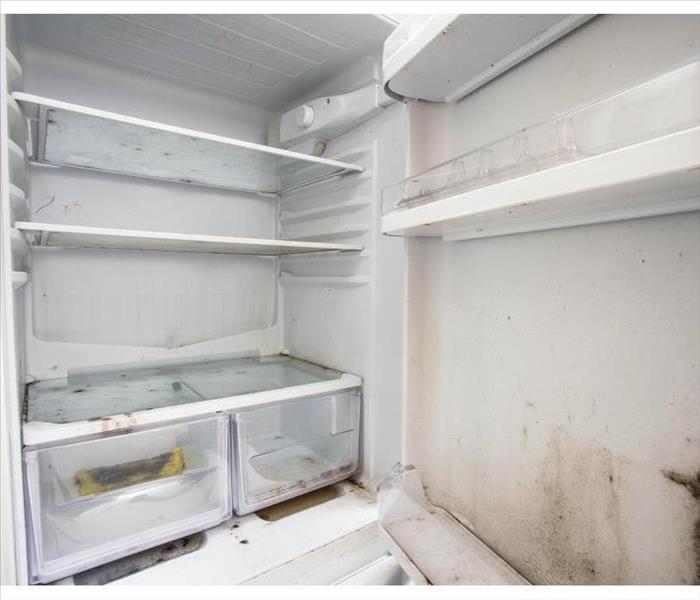 Any food spills that go uncleaned just serve to invite mold
Any food spills that go uncleaned just serve to invite mold
Mold Can Appear Anywhere Excessive Moisture Is Present
Mold is a pesky home invader that can appear almost anywhere in your home. In order to perform a thorough home inspection, you need to make sure you're checking every possible hiding place for mold growth, not just the primary locations. Consider adding the following hidden spots to your next mold inspection in order to protect your home in Gainsborough, GA.
1. House Plants
Overwatered house plants provide ample moisture and organic nutrients for mold to thrive. Prevent unwanted mold by only watering your plants at the base (not from the top) and proportioning out an appropriate amount of water.
2. Window Sills
It's likely to find mold on wood, such as your wooden window sills. This is especially likely after large amounts of rain, or if your indoor humidity levels are too high. Check for excessive condensation on your window panes that can lead to unwanted mold.
3. Walls and Wallpaper
Moldy drywall can be harder to spot, so you need to make sure you're keeping an eye out for other types of signs. Peeling, browning, or otherwise aging wallpaper is a good indication that mold is growing underneath the wallpaper. Also, check for a musty odor.
4. Refrigerator and its Contents
Any food spills that go uncleaned just serve to invite mold. You also need to make sure you regularly clear out any food items that have gone bad or are otherwise spoiled.
5. Washing Machine
It's easy to forget to check the washing machine, as many homeowners naturally assume that it's self-cleaning. Neglecting to completely dry the moisture from the drum can lead to mold growth. Prevent this by airing out the drum after each cycle and regularly running a high heat wash cycle with white vinegar.
As a general rule of thumb, mold can appear anywhere excessive moisture is present. It's important that you check every hidden corner of your home. If you do discover mold growth in your home, you need to contact mold remediation experts immediately.
What Can and Can’t Be Salvaged After a Fire?
9/18/2020 (Permalink)
 Canned food needs to be toss right away
Canned food needs to be toss right away
Even a small fire in your Doraville, GA, can be devastating and overwhelming. Along with sorting through charred items that you will have to throw away, it can be confusing as to what is and isn’t salvageable. When it comes to high heat, it can severely damage items without them visibly looking damaged.
5 Items to Toss
From burning, melting plastic to stains and smoke damage, some materials aren’t able to withstand the heat and aftereffects of flames. Throw away the following items if they have been in close contact with smoke, flames, soot, or heat.
Non-Perishable Foods – This includes canned, boxed, and shelf-stable goods. If the package has been opened, it is especially important to toss it.
Perishable Foods – Any foods left at room temperature, such as fruits, will need to be discarded. If the heat was constantly high for more than two hours, items in the refrigerator and freezer may also have to be thrown away.
Medicines and Cosmetic – These items often have chemicals or minerals of them that could be affected by extreme heat, resulting in a change of composition.
Burned Fabrics – Clothing, bedding, curtains, and other fabrics with visible fire damage and stains shouldn’t be kept. If there is minimal staining, a professional fire restoration specialist may have the tools to restore your belongings.
Damaged Mattresses and Furniture – Although wood furniture may be salvageable if there are only stains, flames from a fire can degrade their structural soundness.
Salvageable Items
As you look at the damage, it may seem like nothing can be saved. Luckily, with the right help, you may be able to salvage more than you thought. Nonporous surfaces are the easiest to rescue, such as glass and metal, and may only require thorough cleaning and deodorizing. Hardwood floors that have barely been affected can also be restored.
While the first thought may be to throw away everything in sight after a fire, take a moment to inspect the damage. Although the items above should never be saved, you may not have to face a total loss.
When and How to Sue Your Landlord Over Black Mold
9/9/2020 (Permalink)
When and How to Sue Your Landlord Over Black Mold
If your office in Dekalb, GA, becomes infested with black mold, the fungus needs to be removed. Mold cleanup is costly, particularly if it infests your pipes or necessitates wall replacements. In such instances, it may make sense to recoup damages by suing your landlord.
Debt Quantification
Deciding whether to pursue a small claims lawsuit first involves tallying losses. Liabilities associated with mold cleanup include the following:
- Lost income resulting from temporarily shutting down.
- Cost of rehabilitating property that must be repaired.
- Value of replacing ruined equipment. Renters’ insurance sometimes covers this but might exclude mold.
- The incalculable emotional burden endured by you and your staff.
Call your landlord to discuss the matter. Should that fail, mail a demand letter. Make certain the document is delivered by return receipt so you can prove your good-faith effort to resolve the conflict. Only after your landlord does not respond may you begin taking remedial action.
Qualifying Litigation and Evidence Collection
Different jurisdictions place varying limits on small claims, generally ranging between $3,000 and $10,000. Contact an attorney who specializes in suing over black mold if you believe your expenses fall within the qualifying range. Note that not all states allow attorneys to accompany litigants during small claims.
Once you and your lawyer have determined your case’s viability, prepare the evidence. A high-quality test kit, available over the counter, can provide documentation that mold exists. Take multi-angle pictures of all affected areas and catalog every receipt generated while dealing with the fallout. A professional mold remediation company can conveniently give you a detailed accounting of necessary repairs. You will also want infrastructure such as plumbing and venting inspected to check that no health code violations have been triggered. Keep all information in a clasped folder to prevent materials from getting lost. Now, simply present your case in court for a judge to decide.
Black mold clean up is always expensive. If you determine your landlord has caused your situation, do your due diligence by collecting evidence and hiring a qualified attorney who can assist in getting what you deserve.
After the Flood: Can Your Important Business Documents Be Saved?
9/9/2020 (Permalink)
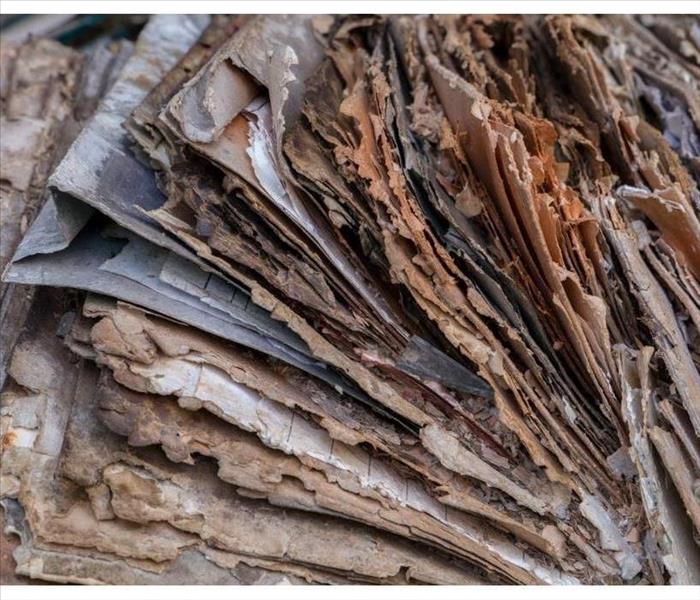 It’s every business owner’s nightmare: wet documents after a flood
It’s every business owner’s nightmare: wet documents after a flood
Overview Of The Document Restoration Process
It’s every business owner’s nightmare: wet documents and loss of inventory after a flood. It may feel like you’ll never recover your important paperwork, but an experienced water damage repair specialist can make your files can look like new. Here’s an overview of the document restoration process.
How Does the Cleaning Process Work?
Advanced restoration technology can get your files back to new, and the document drying techniques used by your specialist will depend on the extent and nature of the water damage. Most media will undergo a similar process which usually includes:
- Drying with the vacuum-freeze method
- Disinfecting with gamma irradiation technology
- Deodorizing to remove unwanted smells
What Kinds of Media Can Be Recovered?
You might be surprised at the kinds of content that can be recovered. Even the most delicate archival manuscripts, photographs, and books can be saved with the right technology. Other types of wet documents that can be repaired are maps, blueprints, and even X-rays. The files and documents you store in your office can be cleaned and restored along with any other paper media you may have.
How Can Documents Be Protected After Restoration?
Along with preventing water leaks and flooding before they start, the best thing you can do for the future of your business is to digitize your recovered documents for cloud storage. Some restoration service providers will even do this for you as part of their cleanup procedures. It’s a smart idea to invest in a digital backup service so you can archive your files off-site, without the worry that the only copies are stored within the walls of your building.
Business owners in Brookhaven, GA, have many responsibilities to fill daily. With a little prevention and planning, doing your own disaster recovery won’t be one of them. Rest easy knowing that even if you find wet documents in your office, they can be safely recovered, protected, and stored for the future.
Can Electronics Be Cleaned Up After a Fire?
8/25/2020 (Permalink)
As you try to pick your business back up after a commercial fire near Dunwoody, GA, you have a lot to think about. You need to find a trusted fire restoration company that can help you through the entire process. This team knows how to clean damage walls, furnishings and even electronics. An electrical fire can cause a lot of damage to computers and other electronic devices, but sometimes this equipment can be salvaged after the flames are gone. With the proper steps, some electronics can become as good as new.
Steps to protect your electronics after a fire.
• Avoid Power: While you may be tempted to turn on a computer to see if it works, the truth is this can cause more harm than good. If smoke clings to the metal surfaces in your device, you can start a terrible corrosion by adding power to the mix. Leave any electrical devices turned off.
• Get Them Cleaned: Remember that smoke residue? That has to be removed from every inch of the device. For this reason, a computer cleanup can take a while. The professionals will go over every inch of the hardware to ensure the potentially dangerous residues are gone.
• Have an Inspection: After the initial cleaning, you may want to have the electronics inspected one last time before adding power. This final inspection can look over the computer for more signs of fire or smoke damage. An electrical fire can cause unexpected smoke residue buildup on internal parts of the computer, so a second inspection is a good idea.
Many businesses rely on computers and other electronics to get business done. Restoration professionals may be able to help you restore computers, television sets, DVD players, cash registers, security systems and other electronics key to your day-to-day activities.
An electrical fire can do a lot of damage to your commercial building. Restoring your belongings after the disaster can help you get back on your feet.
The ABCs of Flood Insurance
8/7/2020 (Permalink)
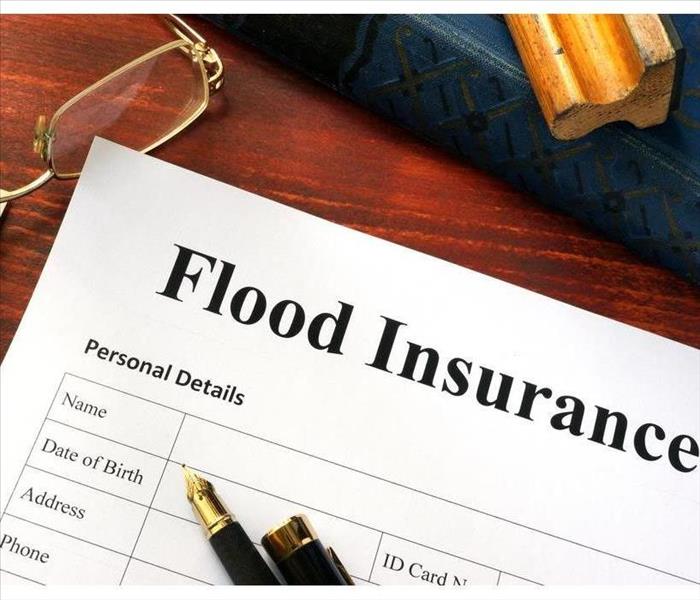 If you do not have flood insurance, other programs may be able to provide financial assistance to you
If you do not have flood insurance, other programs may be able to provide financial assistance to you
If your home in Chamblee, GA, is hit by a flood, it's good to know that you are not alone. A number of agencies and companies can help you in a time of unprecedented disaster. Immediately following a flood, you may need help with rescue or medical assistance. First responders, EMTs, and other professionals answer the call to make sure those suffering are taken care of. The next step is to see if you have insurance coverage. This is usually offered by the federal government under the National Flood Insurance Program.
This program, administered by FEMA, is only available in certain communities, typically those located on a flood plain. The goal of the NFIP is to reduce the impact of floods on private and public structures.
What To Do If You Have Insurance for Flooding
You should follow certain steps if you have this insurance. Understanding how the process works can help you cope with this difficult situation. Follow these steps to get the claims process rolling:
- Contact your insurance agent or adjuster to report your flood loss
- Document the damage to your home when it is safe to do so
- Work closely with your insurance company
- Receive your payment
If you do not have flood insurance, other programs may be able to provide financial assistance to you. Loans and grants are often available to homeowners and renters hit hard by flooding.
Who Else To Contact After a Flood
Flooding causes serious damage to a home. It also raises a number of safety issues. Calling in a local storm remediation company is an important step in your recovery. Workers with expertise and experience can arrive quickly and determine the best course of action. They can secure the home for safety, remove the water, and begin to work on cleaning and restoring the home to its original condition. An experienced company can also help document the damage for your flood insurance claim.
3 Tips for Avoiding Mold Growth in the Bathroom
7/29/2020 (Permalink)
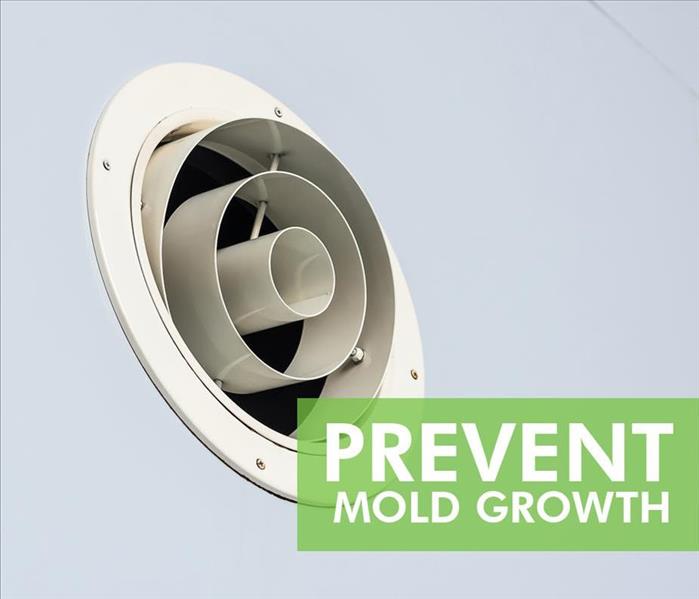 Air vents and bath fans move moisture from the bathroom and send it outside
Air vents and bath fans move moisture from the bathroom and send it outside
When it comes to preventing water damage, the bathroom presents some of the most difficult challenges. This room seems to have less airflow, more moisture, and more ways for water to seep where it isn't wanted than other rooms. In spite of the challenges, it is possible to control water and limit mold growth in your Dunwoody, GA, home.
Install Air Vents and Bath Fans
No matter where you live, whether in a home or apartment, in a humid environment or dry climate, a high level of humidity in the bathroom will make it nearly impossible to prevent mold. Consistent cleaning is very important, but to make sure that mold doesn't grow, you need a way to keep the room dry. Air vents and bath fans move moisture from the bathroom and send it outside. Run the fans during showers and baths. Let them continue running for about half an hour afterward. It's also important to make sure the fan has the right cubic feet per minute (CFM) volume for the size of the room.
Fix Leaks Immediately
Whether you notice drips building up on the pipes in the cabinet or water seeping from the faucet, you need to immediately address the problem. Eventually, leaks cause water damage and when leaky pipes aren't repaired right away, the resulting damage becomes much harder to deal with and more expensive.
Clean Out the Shower
Many people leave shampoo, conditioners, sponges, and other bathing items on shower shelves or floors. As these items dry, water often pools beneath them. This creates a welcoming environment for mold spores. It's better to remove those items, dry them off, and store them outside of the shower. Make sure you regularly wash your towels, washcloths, and rugs; most experts recommend washing them at least once a week.
Of course, mold prevention is better than cleaning up water damage and mold growth. If mold grows in spite of your efforts, reach out to water and mold damage cleanup and repair professionals. In addition to cleaning up, they can provide you with recommendations for further prevention methods.
How To Prepare Your Business for a Fire
7/9/2020 (Permalink)
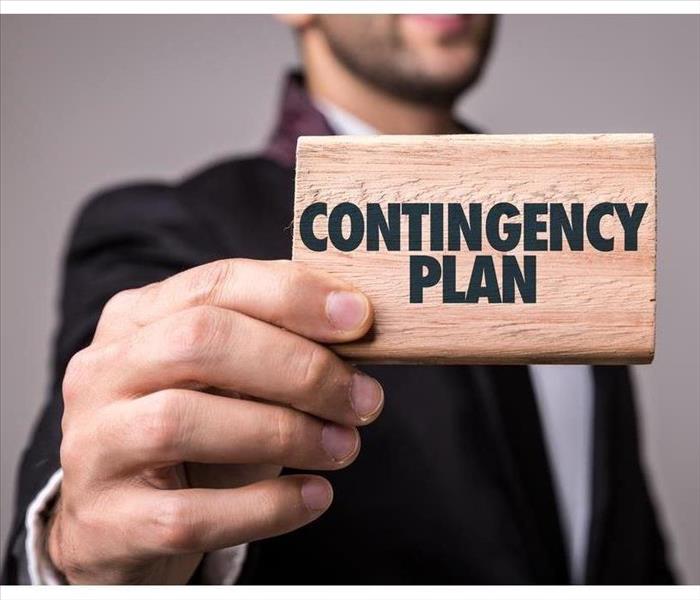 Create a contingency plan for your business
Create a contingency plan for your business
How To Prepare Your Business for a Fire
As a business owner, there are many things you can do to prepare your building and employees for emergencies. Your efforts toward creating and maintaining a safe workplace should include writing a contingency plan. There are five steps, outlined by the Department of Homeland Security, that are involved in putting together a plan of action:
- Program management
- Planning
- Implementation
- Testing and exercises
- Program improvement
Take a look at how preparing your business for a fire-related emergency might look.
Program Management
The success of your preparedness plan depends on the commitment of management. This means you need to commit to spending time and some money on creating the plan and providing appropriate resources. This step also involves researching regulations in your area that outline the minimum requirements for workplace fire safety.
Planning
At this stage of creating your fire contingency plan, you should gather as much information about fire hazards and risks as you can. Your insurance provider may be an excellent resource. You could also reach out to fire damage cleanup and restoration professionals for another perspective. Complete a business impact analysis and look at methods of reducing fire hazards.
Implementation
At this point in putting together your preparedness plan, you should have written explanations for resource management, emergency response actions, emergency communication protocols, employee responsibilities, incident management steps, and scheduled trainings.
Testing and Exercises
Train your employees in the steps of your plan. Clarify the roles and responsibilities of individuals and run drills to support employees' abilities to follow your evacuation plan. During this step, watch out for any weaknesses in your plan and reach out to the Mount Vernon, GA, fire department for advice about making improvements.
Program Improvement
During this final step, schedule reviews of the plan to keep it up to date, look for ways to evaluate the effectiveness of the plan, and use your reviews and information from tests and exercises to improve the plan.
Putting together a contingency plan for the hazards your business may face should focus on keeping your employees and your physical properties safe. Start today and reach out to available resources in Mount Vernon, GA.
5 Tips for Water Damage Prevention at Your Business
6/15/2020 (Permalink)
 Knowing what weather to expect in your area can help you prepare ahead of a storm
Knowing what weather to expect in your area can help you prepare ahead of a storm
5 Tips for Water Damage Prevention at Your Business
Did you know that the same professionals who restore water damage from water in home incidents can also help protect your Perimeter Center, GA, business? Your local SERVPRO team are proud of the fact that they can be Faster to Any Size Disaster for any water damage needs. They can even help your company mitigate possible damage by using the following five tips.
1. Stay Aware of The Weather
Knowing what weather to expect in your area can help you prepare ahead of a storm. This knowledge will help you take the time you need to cover over vulnerable spaces on the property, or set up water barriers.
2. Regularly Inspect the Property
Inspecting the property regularly may allow you to catch potential problems before damage is caused. For example, you may be able to spot weakened plumbing before there’s a broken pipe which requires a pipe cleanup.
3. Contact a Professional for Assessment
Just like if you have water in home areas, you can contact a professional with assistance with any flooding in your business. They can assess the property for possible damage prone areas, and help recommend mitigation tips to protect the space.
4. Make Any Repairs Quickly
The quicker repairs are made the less likely the property is to face additional damages. This is why it’s important to address any damage to the building even it is not directly water-related.
5. Use Water Barriers if Needed
If you’re ever facing any heavy storm weather, you may want to consider using water barriers, to protect the company property. These can be set up to direct water away from doors or other vulnerable spaces.
Whether you want to prevent water in home or business areas, your SERVPRO team can help you mitigate possible damage. Stay aware of the weather, regularly inspect the property, and contact a professional for help if you believe there may be an issue. This way repairs can be made as quickly as possible. It’s also a good idea to use water barriers if you think there may be a need.
We are Cleaning Experts
3/20/2020 (Permalink)
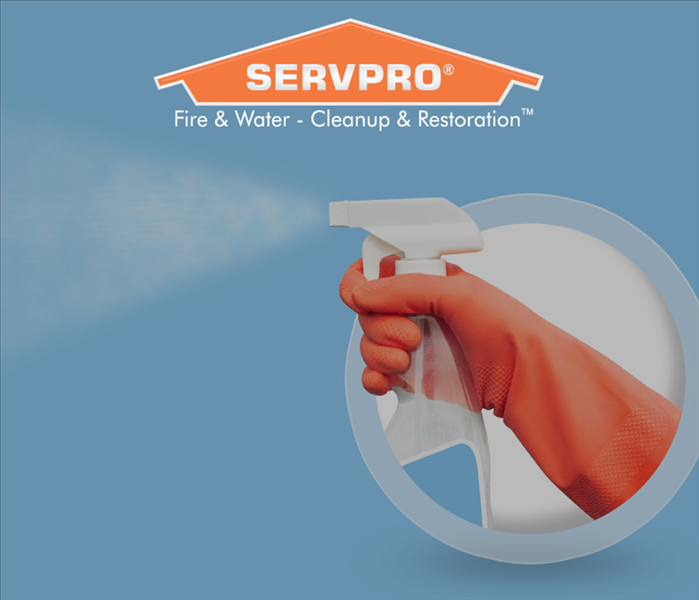 We can handle commercial and residential jobs
We can handle commercial and residential jobs
SERVPRO is Here to Help during this time of need
During this unprecedented time caused by the global pandemic of coronavirus, this is a reminder to our customers that we are specialists in cleaning services, and we adhere to the highest cleaning and sanitation standards.
Specialized Training
We are prepared to clean and disinfect your home or business, according to protocols set forth by the Centers for Disease Control and Prevention. We have years of experience in dealing with biological contaminants, and we will go beyond the scope of work that regular janitorial staff perform on a daily basis.
The CDC encourages cleaning of high-touch surfaces such as counters, tabletops, doorknobs, light switches, bathroom fixtures, toilets, phones, keyboards, tablets and tables. Other spaces mentioned in the CDC’s guidance for commercial spaces include:
- Kitchen/Food Areas
- Bathrooms
- Schools/Classrooms
- Offices
- Retail Spaces
- Water Fountains
- Shelving/Racks
- Sales Counters
- Carpets and Rugs
- Stair Handrails
- Elevator Cars
- Playground Equipment
- Fitness Equipment
Specialized Products
The CDC recommends usage of a labeled hospital-grade disinfectant with claims against similar pathogens to the coronavirus. Multiple products in the SERVPRO product line carry the EPA-approved emerging pathogens claims. While there is currently no product tested against this particular strain of the coronavirus, we are following all guidelines as provided by the CDC and local authorities.
Call Today for a Proactive Cleaning
If your home or business needs deep cleaning services, call the experts today – SERVPRO of NW DeKalb/Dunwoody/Brookhaven, (770) 396-3883
 Extreme temperature changes can lead to severe weather. SERVPRO of NW Dekalb/Dunwoody/Brookhaven is a click away if you experience any damage.
Extreme temperature changes can lead to severe weather. SERVPRO of NW Dekalb/Dunwoody/Brookhaven is a click away if you experience any damage.





 24/7 Emergency Service
24/7 Emergency Service























































